#and i assume the solution to homophobia is for gay people to stop talking about their homosexuality right?
Text
multiple times now I've seen people genuinely claim that the solution to aphobia is for asexual and aromantic people to stop talking about their asexuality and aromanticism. if you think like this you need to be put in a meat grinder like actually
#'yeah guys the solution to aphobia is for aces and aros to just shut up!!' what if i destroyed everything you loved actually#and i assume the solution to homophobia is for gay people to stop talking about their homosexuality right?#same thing with transphobia?#yeah guys the solution to your discrimination is to just stay in the closet!! thats totally a normal thing to suggest!!#oh no suddenly thats homophobic and transphobic to say#but its fine to say it about aces and aros bc everyone hates us i guess#aphobia#asexual#aromantic
303 notes
·
View notes
Note
"o&o are the dumbest motherfuckers too" why?? what did they say? spill the tea
hello anon! i sound bitchy in this but it's just because im ranting i dont want you to think im being bitchy towards you!
disclaimer everyone <3 dont try to debate me
i do not know to which post you are referring to but i have no doubt i said this because they are the dumbest people. Did they make one of my favorite pieces of media of all time? yeah. Did they write beautiful complex characters? yeah. Am I jealous of the artstyle and wish so bad for it to be mine? yeah. Did they write a incredibly interesting and intense story with so many little details and plots that I'm still talking about it 15 years later? yeah.
But they are dumb. Now, again, idk what post you're referring to so idk what i'm calling them dumb about. But one, they're homophobic. they've made several homophobic remarks (which i don't have specific evidence of rn so i wont say anymore about that) and even had a bunch of homophobic elements in the death note draft, one that I can think of off the top of my head is the one where aizawa tells them to stop being gay and obsessing over misa or something. I have a screenshot lemme find it.
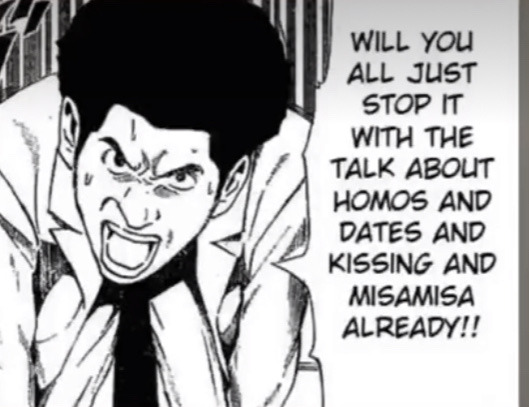
love it. I've had this screenshot for a long time, so i forgot where I found it. Anyway, they're also misogynistic. The evidence is how the women in the show were treated.
But if we disregard all that, there are so many annoying IMPORTANT plot holes (I can excuse misogyny and homophobia but i draw the line at plot holes/ you can excuse misogyny and homophobia?) And im not one of those people that are like wow they said this [irrelevant detail] in episode 2 and now they said [different irrelevant detail] in episode 30, this show sucks. No. I mean when Light and L were literally chained together and L told him he wouldn't let him out of his sight (which btw people need to stop whining and crying over lol Light literally had 0 issues with it. the only people not accepting of it were soichiro and misa- Light literally was like alright sure...anyway-)
there's just things that they didnt need to necessarily show, i understand. Like bathing, pissing, private stuff. A thing like this wouldn't show us that type of scene unless it was relevant. I could argue that it was relevant though lol. So it was left up to the viewer to guess what happened with those scenarios. Because must i remind you, L and Light were chained together for around 3 months. These scenarios had to have happened. and with the emphasis on L not wanting Light to leave his side I, and everyone else, assumed that L wouldn't just unlock the cuff and be like pee break! So what happened during those scenarios? Well, people, including me when I was 12, were like "Ahh gay things happened during those scenes" which is just what happens. If you have a public fictional world, people are going to ship the characters. Lawlight was one of the most popular ships. Ik young and new fans of dn dont know that but it was up there in popularity. Not even in anime circles. Just popular all around.
But o&o heard of this and they decided it was their right to disprove every gay scenario people were coming up with. Which is why you see L in the washing machine drawing. Because how can they shower together if L takes baths in a washing machine huh? checkmate you can't make my character gay! even though it's physically impossible and even if it wasn't, Light, again, would be out of his sight because he'd be in a fucking washing machine. Anyway, they also come up with the solution to using the restroom together, which is just L sits weird. Which honestly isnt bad like it's kind of funny and i get that. But when I known it's just a retaliation against people shipping them it's annoying. (how can peeing being sexy if he pees like this? like peeing together is ever sexy ??:&:!/@!::&) and then the sleeping together bit! o&o had a perfect plan for this...which is L does in fact sleep. But he and his chair fall sideways and that's how he sleeps. and he needs watari to come pick him up. it's just annoying. you can't not show these scenes and basically leave it up for interpretation and then when people are using it gayly you retaliate with childish workarounds.
not to mention the little comics in the back of how to read 13 when they made them so impossibly straight it's hard to read. Like it's embarrassing to read. okay...okay... i didnt know i had this much to say about o&o. i'll be done now.
#the disclaimer is only there because people have started trying to debate me#even in tags#like how am i supposed to debate with tags#i just end up blocking yall whats the point#long post#death note#lawlight#light yagami#l lawliet#o&o#ask#anon
60 notes
·
View notes
Text
Not Worth It
Whumptober 2021 - day 3 - prompt: insult
Character: Reid
Warnings: ableism, r-slur, brief/mild homophobia
Words: 2.2k
Summary: Spencer isn’t naïve. He is young and he looks young but he isn’t stupid. He hadn’t graduated with the expectation that because he was older, had qualifications to back him up, the world would collectively mature in kind. After all, he’d gained his relative immunity to insults because it hurt less to let them taunt him than it had to confront them and end up shoved in a locker or tied up on the football field.
He had hoped things might be different. Not expected. Not assumed.
Just hoped.
ao3 / masterlist
“—were actually invented in the early fifteenth century, though the first versions were, uh, significantly more spherical and made of a wood like beech. It’s also highly likely they used cows’ hair inside leather—”
The cop – Maciewicz – nudges the officer beside him. “Does he ever stop talking?”
Spencer is fairly sure the jab is intended to be audible. It’s an interesting social convention, that sort of insult, where everyone including the target hears it but the person who said it can’t be called out on it because they supposedly directed it at nobody in particular. Interesting, and very high-school of them: Maciewicz is closer to forty than thirty and beginning to bald, and the stale remnants of cigarette smoke follows his colleague wherever he goes.
It doesn’t offend Reid these days. Attending a public LA high school is its own distinct circle of hell but doing so at nine? University at twelve? He’s been called most names under the sun and petty insults don’t get under his skin like they used to.
Which isn’t to say they aren’t annoying.
What he hates the most is the variety of people who insult him: they all have different reactions, different sore spots, and getting them to go away isn’t a one-size-fits-all situation. Reid has dealt with enough bullies to understand that ‘ignore them and they’ll go away’ is useless, if not downright dangerous advice, but there is a whole spectrum of solutions which may or may not work. Get it wrong, and they just grow more persistent.
Spencer isn’t naïve. He is young and he looks young but he isn’t stupid. He hadn’t graduated with the expectation that because he was older, had qualifications to back him up, the world would collectively mature in kind. After all, he’d gained his relative immunity to insults because it hurt less to let them taunt him than it had to confront them and end up shoved in a locker or tied up on the football field.
He had hoped things might be different. Not expected. Not assumed.
Just hoped.
Of course they aren’t.
He pays them no mind and continues to explain the significance of the golf balls their unsub keeps leaving behind. If they didn’t want him to talk, they shouldn’t have asked for his opinion.
This seems like a fairly straightforward case and with any luck, they’ll only have to tolerate the local police department for a couple of days more.
He may have jinxed it.
(Once when they had come to take his Mom to inpatient, Spencer had overheard someone at the front desk talking lowly to someone else, and her words had stuck with him: see, that’s what you get for saying it’s quiet today!
That was always the gist of what was said on TV hospital dramas too. Police chaos isn’t all that different from hospital chaos, he thinks. There’s always too much of it and it’s unpredictable in its unpredictability.)
The curveball this time is their unsub is not a lone male but a male-female duo – he carries out the kills but under her direction. Classic submissive-dominant dynamic. The thing with pairs is they crack. Bend under the pressure until they break and lives are lost in the collateral damage.
Case in point: Marcy Edgeworth, aged twenty-four, Caucasian female, death by blunt force trauma. She is the first female victim and the first to have been left to lie where she’d died. That isn’t a good sign. No indication of sexual assault pre- or post-mortem but there is an incomplete ring of bite marks just beneath her right collarbone, exposed due to her torn shirt.
“What, never seen a naked girl before?” Jamison – Maciewicz’s colleague – mutters. Just low enough for Spencer to hear as he is trying to get on with his job, unlike a certain pair of officers.
“Woman,” he corrects, for her age, “and yes, I have.”
He hopes the lightness in his tone offsets the brusqueness. Spencer shifts his crouching into kneeling and leans forwards to examine her hair. It’s an artificial red – her roots and her eyebrows are blonde – and their previous victims have all had brown hair.
“Only counts if it’s outside a morgue,” Maciewicz chimes in.
He ignores them but their gaze burns the back of his head, and their presence has his guard raised. They stand behind him and their shadows stretch out over the grass either side of him. They’re going for a reaction, Spencer assumes.
Biting is an interesting thing without an accompanying sexual assault. If nothing else it gives them a good estimation of their male unsub’s teeth. The impression he’s getting from the scene is one of interruption, an impulse kill whose victim he had to leave too soon. It is a public park and it was an early-morning dog walker who found her – likely a jogger or someone on a night shift.
Jamison clears his throat once, twice, then taps him on the shoulder. Spencer rears away from his touch. People never ask, they just do.
“Yes?” he asks.
“Oh, nothing,” Jamison says. “I – we – we were wondering why you do that… thing.”
“What thing?” Spencer asks.
Jamison gestures. “You know, the – you know.”
Is that some sort of punchline he’s missing? Spencer glances over at Maciewicz and finds a mild amusement. Nothing to indicate he should be laughing, nor should he know what they do mean.
Maybe he’s missing the cue. He’s better at it these days, but not perfect.
“No, I don’t.”
With a furtive glance at the precinct’s captain, deep in conversation with one of the forensic technicians, Jamison sighs. “The thing with your hands, the—” He shakes his hands in an exaggerated manner.
Spencer’s hands still. He hadn’t thought it was very noticeable and more to the point, Jamison is definitely overexaggerating it like kids in middle school used to do. Only back then they had his unusual gait and meltdowns to mock too. “I don’t do that,” he says firmly.
(He’d answer it if it was a genuine question. Respectful. He loves people who ask out of genuine good intent. They are few and far between.)
Maciewicz snickers.
“Yeah, you do,” Jamison says. “I want to know why, that’s all.”
“Makes you look like a retard,” Maciewicz adds.
…and there it is.
He goes cold from head to toe. It never fails to make him feel as if someone has just dumped a bucket of water right over him, washing away his enthusiasm and excitement and everything else he values. Leaves the bare bones, the weirdness, each of the hundred ways he never quite fits in.
Spencer hates the word.
Because they don’t care about his IQ or eidetic memory or reading skill when they say that, and they don’t care after he tells them.
Nobody calls him that because they think he is. They say it to hurt him.
He wishes it wouldn’t.
Despite how often he’s heard it, he never has a response. His mind goes blank and all he can pull from it is the roots – re,from Latin: back, and tardus, from Latin: slow – as if they give a damn about etymology. As if that’s a normal person’s response. Today is no exception so it’s a blessing when Morgan wanders over.
“You got anything, pretty boy?” he asks. Maciewicz and Jamison snort. If Morgan hears it, he pays it no mind. “They found a guy’s baseball cap over there. No hair but it looks like it’s our man’s.”
And once again, his mind goes blank. Makes you look like a retard. He’d been thinking about – the bite mark, yes, what does that indicate? Spencer catches his hands moving and shoves them in his pockets before they can. “He was interrupted,” he says. “It explains why the bite isn’t complete and why he didn’t notice he’d left his hat.”
Morgan nods. “The person who found the body didn’t recall seeing anyone else around, so you think he’d just left before they got there?”
“Probably,” Spencer says. “I think the woman might be blonde. If they got into a fight, he’d be stressed, he’d be thinking about her. Maybe she reminded him of her.”
“Could be the hair, could be something else,” Morgan says. “He won’t have talked to her, not if he hit her from behind.”
“What if they did? She could have walked away—”
“Maybe,” Morgan says. “But if her hair was dyed, he wouldn’t see that unless they were up close, right? He’d initially go for her because she’s got red hair, not blonde. And if they did talk, Prentiss says no woman’s gonna just turn her back on a strange man. Especially in the middle of the night with no-one around.”
It’s a valid point, and it isn’t condescending. Nonetheless it hurts. Spencer studies the ground for a long moment and tries to forget (retard) Maciewicz and Jamison. “The unsub isn’t going to be someone he’s sexually attracted to,” he says. “He didn’t assault her, and if the victim reminds him of the other unsub, he’d probably have tried to even if someone interrupted him before he really could.”
A burst of laughter from Maciewicz and Jamison. His cheeks go hot with embarrassment—they must be talking about him, what else is there to laugh about? Morgan follows his gaze. “There a problem?” he asks.
Maciewicz holds up his hands in mock surrender. “No, no. Just… the hell is that about, ‘pretty boy’?”
Morgan shrugs. Spencer isn’t sure if it’s as casual as it looks.
“Well, makes sense,” Jamison says. “Course he’s gonna freak out over a naked girl if he doesn’t swing that way.”
…oh, great.
Spencer doesn’t mind exactly what they say as much as the implication—that they know, that they’re entitled to know his sexuality. How they say it as if gay is equivalent to bad. Once again, how utterly high school it all is. And he knows Morgan isn’t going to appreciate it either, probably more insulted on his behalf than Spencer himself.
“And you care, because...?” Morgan says, looking back and forth between them.
“I don’t,” Jamison says.
“He’s…” Maciewicz stammers, “…you know.”
“Smarter than you?” Morgan suggests. “Better at his job than you? A better person than you?”
“You don’t have to stick up for him,” Jamison says. “Must get annoying to deal with a re—”
“It’s fine,” Spencer interrupts. It isn’t. It really isn’t but it isn’t worth the conversation. How tiring it gets to deal with it, how much easier it is to walk away. These officers aren’t going to change their worldview on disabilities all of a sudden. “Morgan.”
Morgan takes in his posture, the unnatural stillness as he forces himself not to fidget, though the look in his eyes doesn’t fade. “The only people I don’t want to ‘deal with’ are both of you.”
The men share a look – not so much chastened as disappointed their fun was interrupted – but they do back off.
“They already seem to think I’m incapable,” Spencer says irritably. “I said it was fine, I didn’t need you to say anything.”
He crouches down to examine the bite again.
“It didn’t matter,” Spencer says. His hands itch and despite needing to, he can’t bring himself to move. Makes you look like a retard.
“Does if it bothers you,” Morgan insists. “And it did, don’t look at me like that.”
He sighs. They’re not even there any more, the two cops out on patrol and them revisiting the penultimate crime scene. “I’m used to it.”
“And?” Morgan says. “Just because you are doesn’t mean you have to put up with it—”
“It was five minutes at most,” Spencer points out. “Everyone else was fine.”
“Yeah, and they were dicks.”
He shrugs.
“What else did they say?”
Spencer rolls the fabric of his sweater between his fingers and feigns ignorance. “What do you mean?”
“I mean, what else did they say when I wasn’t there, ‘cause they said something.”
“Makes you look like a retard.”
He doesn’t mean to say it – wasn’t sure what he had planned to say, but it certainly wasn’t that – but he says it nonetheless, his tone mimicking the disdain and irritation. And now Morgan definitely isn’t going to believe him if he says he’s fine and it’s going to make the situation worse to explain that he mostly is, he just hasn’t heard it for a while, he’s used to it.
Stupid echolalia.
“Like I said,” Morgan says, “they were dicks.”
Spencer doesn’t point out being rude doesn’t automatically mean lying. “I’ve heard worse.”
“Yeah, but that doesn’t give them the right to say stuff like that.”
He rocks back on the balls of his feet. His hands aren’t co-operating but the swaying motion is a good substitute. “I’m okay.”
“You know,” Morgan says casually, “whenever you lie, you stand exactly the same way.”
Spencer looks up. The expression on Morgan’s face falls somewhere between sadness and sympathy but, he thinks, not pity. It’s a nice change.
“Kid, the only thing you’re gonna get from pretending you’re OK is worse,” Morgan says. “It’s not worth it. Not for anyone but especially not morons like that.”
“It’s not worth it,” Spencer repeats. The words catch in his thoughts and he murmurs it again and again and Morgan isn’t even slightly annoyed at him.
(It isn’t worth it—he knows this—but maybe it is. Just a tiny bit. Just for the part where he has friends who tell him things like this, who don’t mind when he’s awkward. Who don’t mind him.
Friends who say nothing about it but when they get back to the station, the pair are getting chewed out by a pissed off captain.)
A/N: I had trouble getting this to flow as well as my other ones, there's something about it I just can't figure out. Regardless, I hope you enjoy it.
#whumptober2021#no.3#insults#criminal minds#fanfic#cw: ableism#fanfiction#cm fanfic#cm fanfiction#reid#spencer reid#eldrai does whumptober
17 notes
·
View notes
Text
Virgil, the Small Purple Emo
Welp, it’s just past midnight on the 23rd, so it’s time for me to share my Secret Santa gift to @midnightsdarkangel!
FYI: this is my first attempt to even envision anything relating to GT on my own, without someone else explaining it to me, so I hope it’s alright? Let’s just say this idea came about after making the joke of “Virgil the Giant Purple Emo” in a conversation involving Clifford the Big Red Dog... that was the inspiration...
AU: Love Makes You Grow AU
Words: 2172
Pairings: Moxiety
Warnings: Attempt at GT near the end, talk of homelessness, implied homophobia, general sad Virgil. Anything else, please let me know!
Summary: Virgil stopped growing when he was very young, leaving him at the bottom of the societal ladder. He grows cynical after being thrown out. Can a chance meeting with a kind stranger change his life?
---
Virgil had always been small. In fact, he’d stopped growing at age 12, while everyone else around him grew taller and taller. Of course, that had meant he’d been ostracised by most in a world where your size equated to the amount of love you had in your life. He clearly was an unloved child and so that meant he was unworthy of anyone else’s time. All because of who he was.
His family had found out only a few days after his twelfth birthday that Virgil was gay and that was the moment where everything changed. The love stopped. His entire family disowned him, they threw him out onto the street and left him to fend for himself.
Virgil had found ways to survive, of course. He’d managed to get a poorly paying job that gave him just enough money to live on, while also allowing him to barely scrape by at school. He jumped from place to place, sleeping outside most nights. Eventually, he found a small forested area that was visited rarely, and he set up camp there. Virgil scavenged and stole from bins and dumps in order to make it comfortable. By his 21st birthday, Virgil had yet to grow even another inch and was living in a tree house of his own making.
It was haphazardly put together, but it was better than his first four other attempts that had been dismantled to make this one. It was far larger than the others, allowing him to lay flat in his beaten-up, old sleeping bag for the first time as well as giving him space to put what little he owned. It had fewer holes around as well, though Virgil sometimes did miss staring up at the stars, but he much preferred the cover it provided when it rained. But it was just a place for him to retreat to after work. It didn’t need to be the height of luxury. It served its purpose well.
The morning went like any other. He woke up early, did what little he could to make himself presentable before throwing on his uniform and clambering down the tree in order to start his long walk to work. Thankfully Virgil had been able to grab a pair of semi-working headphones from the store where he worked before they were about to be thrown out and so had something to listen to as he made his way through the town. It was familiar, it was boring, it was normal.
But the strangest thing happened while he was at work.
It started as an accident. Virgil had been stocking the lower shelves as usual and had bumped into a customer whilst turning to go back towards where his manager was. “Oh, sorry.” He mumbled, ducking his head to move on out of the way.
The customer laughed softly, “It’s alright! I’m the one who should be sorry. I was just off in my own world and didn’t see you!”
Virgil stopped in his tracks and glanced back at the man he’d walked into. He was tall, very tall… at least around two feet taller - likely even more - than himself, which wasn’t too uncommon. But he’d just talked to Virgil as if he was equal. No reference to how short he was. No annoyed huff and muttering. No threats to get him fired. Nothing. Just a normal conversational response. “Uh, well… um… it’s okay?”
The customer grinned and nodded, “How long have you been working here?”
This was completely abnormal. People usually didn’t want to talk to someone as short as him. Virgil pretended to tidy up the surrounding shelves to look busy as he replied, “Around 9 years or so…”
“No… how old are you!? That can’t be okay!”
Virgil grimaced before explaining that he had just turned 21 that morning. The customer’s face had turned from shock – as he clearly thought Virgil was younger than he was – to sadness.
“Oh, I’m sorry… I didn’t know- I thought that-”
“It’s whatever. Doesn’t matter.” Virgil waved it off. It was his life, he was used to it. This man was going to pity him for a moment, say goodbye and they’d never see each other again. A silence stretched on for what felt like minutes. Eventually, Virgil went to leave but the customer stopped him.
“…When do you get off work?”
Virgil faltered and took a moment to catch himself. “What? Um, I mean, like… around… 8?”
The customer’s eyes were blazing with hope as he reached for the employee’s hands, grasping them between his own, “I’ll meet you outside the shop then! I want to help.”
An odd feeling hit Virgil in the stomach, almost like he was stretching out his muscles for a moment. But it was gone before he could give it more than a second’s thought. This stranger was offering him help, without even knowing him. Apparently, Virgil had agreed, and the customer had gone on his way. The rest of the day was a blur and, at 8pm, he was standing with the odd man outside.
“Oh, I never introduced myself!” The stranger slapped his forehead playfully before holding out his hand, “My name’s Patton! Nice to meet you, Virgil!” He shook their hands once and then turned sharply, beginning to wander down the street, “If you’re okay with telling me, I’d love to know what happened.”
There was practically no context, but of course Virgil knew what he meant. He walked quickly to keep up with Patton’s long strides, “It’s pretty short. When I was 12, my entire family disowned me and threw me out for… reasons. And from then, well, people kinda just avoided me. You’re not exactly wanted when you’re… like me… but I guess you don’t really get that…” He didn’t mean to slight the tall man, but it just happened to come out. After years of public rejection, Virgil had grown bitter and pessimistic. He went to explain this, but Patton simply laughed.
“You’re right, I don’t know what that’s like. No one should have to know what that is like.” Patton seemed wistful as he stared down the street before them. “I’m sorry that happened to you, Virgil.”
That evening, Patton took Virgil to a restaurant close by and treated him to a meal, despite Virgil’s protests and worries. He assured the shorter that there was no expectation of returning the favour or paying him back; it was merely a way for them to sit and chat somewhere warmer as the temperature was quickly declining outside. Over food, the two talked more. Virgil found out that Patton’s life had been without much hardship, especially in the love department. He had a large family that adored him, many friends who he met up with frequently. Everything for Patton was great all while Virgil had the complete opposite. After some time, he opened up a little and told Patton how he was essentially homeless and had been since he was kicked out onto the streets. He had no friends, his co-workers and managers hated him and belittled him for his height. By the end of the meal, Patton’s eyes were swimming with tears that Virgil assumed were pity and not of sadness.
The larger man wrapped Virgil in a tight hug as he wept for him, “That’s so unfair, Virgil! You don’t deserve any of that!”
“It’s whatever. I’m used to it now.” Virgil’s face pinked slightly as he felt the urge to hug Patton in return, while also feeling extremely awkward in the unusual embrace.
“It’s official!” Patton proclaimed once they were finally out of the restaurant. His eyes were determined as he clenched his fists and set his expression, “We’re friends! I’ll come and see you whenever I can!” He quickly dropped it and softened, “Oh, right, uh, if that’s okay with you, of course.”
The shorter couldn’t help the amused snort that slipped out. He shoved his hands into his tattered hoodie’s pockets and smiled softly, “Yeah, sure… just, don’t always pay for stuff for me. It makes me feel weird… deal?”
Patton grinned widely, “Deal!”
From then on, at least a few times a month, Virgil found Patton waiting outside the store for him. They’d wander around the town chatting and just spending time with each other. Sometimes they’d get food, other times they’d find a café and just watch the world pass by. The months passed and the two got closer, meeting up more and more frequently. Virgil showed Patton his treehouse – which he hadn’t expected to cause the man to weep uncontrollably whilst he held Virgil in a spine-crushing hug. Patton, in turn, had brought Virgil back to his house several times, which just hammered home to the shorter how different life was for Patton. During this time, people were becoming noticeably nicer to him.
First, it had been customers. They’d stopped tutting and glaring at him when he was attempting to replace items on the shelves. All of them had suddenly stopped commenting on his height, as had his co-workers and managers. He’d told Patton all this, to which they both settled on the solution that Virgil must just have been looking happier or something. Neither had noticed that Virgil needed much less help reaching for things on higher shelves.
Soon enough, Virgil had to remake his treehouse once again. He’d been feeling claustrophobic in it for a while. He even enlisted Patton’s help in order to make it again. Virgil used up all of his few holiday days to complete the project, while Patton had brought all new materials for the shorter to use. He’d even asked Virgil if he’d like to move into Patton’s back garden instead of staying in the small forest.
“I mean, it’s just closer to your work and you’d be able to come and go whenever you like. A-and if you needed, you could come in and make food or warm up. I mean, it’s just an idea!” Patton had rambled, his cheeks pinkening significantly. Of course, Virgil had accepted. He wasn’t quite ready to actually move into a home – being in his treehouse made him feel safe – but he found that he was really becoming fond of being around Patton almost constantly.
It was the first time he’d spent the night in Patton’s home that everything had really caught up to them both. Several years had passed and they were officially going with the title of best friends. They’d been sitting on the couch, just watching tv and eating. It was nothing they hadn’t done before, but there was something… off. Virgil just couldn’t quite put his finger on it.
It all happened at once.
Patton had taken a sharp breath and sat up extremely straight. Virgil, in a practised motion, looked up to ask Patton what happened and found that he was looking at the ceiling. He then dropped his eye level and found that he had to angle his sight slightly downwards in order to make eye contact with Patton, who was staring up at him with an open mouth.
“What the fuck?!” Virgil screamed, looking down at himself in surprise. He felt himself panicking but did his best to keep himself calm. Sure, he’d noticed that he’d sorta been growing with Patton being his friend, but this was insane. “Patton, what just happened?!”
Patton swallowed heavily before sheepishly giggling, “Um, well… this might be… my fault?”
“Patton. If you don’t explain right this second, I’m going to freak the fuck out.” Virgil said between shaky breaths.
Patton grabbed a hold of one of Virgil’s hands, gently stroking it to calm him down. His face was beet red as he explained himself, “I just realised that… um well, that…” He took another heavy breath before blurting out, “THATIMINLOVEWITHYOU.”
Time slowed. Virgil felt something inside him metaphorically expand at Patton’s confession, almost as though it were only his heart that had grown in that moment. It had a secondary effect, as Virgil considered his own repressed feelings. He realised that he’d pushed down his emotions years ago, as he believed that they’d never be reciprocated. Virgil finally admitted to himself that he loved Patton as well.
The effect was immediate. Patton ballooned in the same way Virgil had. He was back to being far taller than Virgil, which was not exactly a great thing to happen in a building, even if Patton’s ceilings were higher than most.
Nothing had to be said after the shock had passed. Patton reached for Virgil, who slipped between the larger’s arms with ease, neither of them commenting on the fact that Patton’s hair was brushing the ceiling. As Virgil began to swell to a larger height whilst in Patton’s arms, the couple laughed.
“Looks like we’ll be needing a larger home. If you want to stay with me, of course.” Patton offered. Virgil said nothing, responding only by nuzzling deeper into Patton’s shoulder, causing the other to grew a little more in return.
---
My other stuff: http://nekoabi.tumblr.com/myworks
Mobile Accessible Masterlist: http://nekoabi.tumblr.com/post/181954641376/fic-masterlist
General Tag List: @not-so-innocent-bi-sander @didsomeonesayprince @llamaly @justanotherpurplebutterfly @iaminmultiplefandoms @ultimate-queen-of-fandoms2 @lowkeyvirgilobsessed @louisthewarlock @fangsandrainbows @xxladystarlightxx @sleepyssnail @ao-koshka @notalwaysthevillian @pumpkinminette @doces-e--tuga @coloursintheblur @safesandersides @hogwarts-my-love
#Sanders Sides#Fanfiction#Moxiety#Virgil Sanders#Patton Sanders#Anxiety Sanders#Morality Sanders#GT#At least an attempt#Secret Santa#Homophobia#Homelessness#Happy Ending
138 notes
·
View notes
Text
Pitch For Nuisance Corporation Conglomerate Liberal Streaming Media And Satellite Television Channel TO ZAYN
Original written on Grammarly, which hackers know about.
Hello Zayn. How are you?
I am a very busy person. I like to pretend that I observe nothing with meaning when I am fully aware of what is going on with all intricate details. These intricate details affect each other because of choices that people make that are fully conscious. I never got a college degree, consciously that I know of or can remember. I know very little about intuition, logic, common behavior to look for, and business because I was never formally educated consciously. I love marketing if you would like to know. I try to practice my brain skills every day. I want to mature and improve myself because I am motivated to an effective communicator who is also very witty. I like to get things done.
A fact about me is that I am not scared of people. I do not have social anxiety because I am stronger than most people. I tell people what to do. I want to be a great boss someday. I want to impress those in power so I get better job offers because I want to become wise, too. I want to learn to become an adult from other real adults. This is a logical statement.
The truth is, I made Nuisance Corporation about you, Zayn. I always want to impress you, Zayn, because you are worthy of respect. You are mature for your age. You are responsible for Apple Incorporated, which is a famous and respected company for computers and technology.
I am obsessed with learning about the way you think. You help me a lot when I need you to comfort me. You give great advice. I rather talk to you so I can share how I feel about what bothers me. Your mind is like what I imagine what solitude should be like, but I want to be included in your thoughts. We belong together.
I know I mean it when I say that you are the utmost masculine person I know, Zayn. Every move you make is always correct. You intelligently earned your money and are successful. You know the answers easily because you are very intelligent. You know every solution to all types of questions, I guess. What do you not know? You read me well. I look forward to seeing you again every day. I want to get to know you again. I miss you. I think you are capable of human emotions no matter how strong I describe you to be. I think you are the sexiest man alive. You are so brooding and handsome. You seem very antisocial in my favor. I like talking to you. I cannot wait to fall back in love with you. I want to be your wife. I know you're smart. I would donate trillions of dollars to your company for free because I felt like it. One day, I might earn a limitless amount of money so I guess I have a sense of humor after all. I get bored often because I am emotionally detached. You can have a blank check whenever you feel like asking me out. I might give you free money whenever you want to as an inside joke between us, as equals. I don't care what people think of me. I know I'm going to be successful.
The reason why I used the word you created that is based on your real name is because I think it protects us from people who do not like being told the truth. Being liberal means supporting gay and lesbian equal rights, ending Global Warming, and more. I never complain.
I am flirting with you, Zayn. I do not think you are annoying. "Nuisance" is a word that police take seriously. We need protection. There are a lot of creeps and weirdos out there. I am trying to be realistic in the real world. Fake or poser liberals threaten to kill people who are smarter than they are. There are a lot of cults out there, I heard. Besides social anxiety, some people type violent threats in words with a keyboard and post their sentences online, which is very scary to know about. The world is a dangerous place to live in. We should be fine. I want to make you trillions of dollars because I respect your work ethic as the founder of Apple, Incorporated.
To avoid trouble, I plan to mock rich white men who are naive about the real world so that other race groups attack them more instead of me if they know who I am. If rich white men are criticized more than I am, maybe I will be judged less.
I am very manipulative. I predict and interpret behavior. Unlike weak people, I want to be respected without asking more than once. I do not ask to be respected. I want to earn respect, which is completely different. I want a guarantee that I will be respected and left alone forever after I make my first million, then billion, and finally one trillion dollars. I probably am already rich. I might be a trillionaire. It doesn't matter because they both will own the conglomerate. Zayn, your name is in the word "Nuisance". I was joking.
An hour goes by and I feel closer to you, I hope. I am emotionally invested in you, Zayn. You are all I think about. I deserve to love you, Zayn. You are completely hot. I cannot stop looking at your face. You bring me so much happiness when you communicate with me. I enjoy asking you questions. You never stop being interesting to me, Zayn. You make me feel alive. I accept who I am when you compliment me by telling me that I am beautiful and funny. You are kind to me and I am indebted to you for helping motivate me to become who I want to be for you. I never grow tired of you because you are so different.
Now, after this long introduction, I can finally pitch Nuisance Corporation's Liberal Media Television Streaming App And Future Satellite Television Channel.
The Pitch:
Today, an activity worth using energy for is watching television. Why? The reason why watching television can be beneficial for learning about the real world is because of trust. Propaganda may sound like an overdramatic word to ignorant people because it is more commonly witnessed than people know. The media and advertising industries distribute a form of legal propaganda. Propaganda has emotional appeals and tells people what to feel, think, and believe. Some people feel emotions too quickly. That is why propaganda is proven to work. For example, hunger. Advertisements that show pictures of food can make viewers hungry. Why else do people use coupons they get from their mailbox? I am telling the truth. A lot of people accept propaganda because they believe it caters to their needs instead of controlling them in a generalized, efficient way. Otherwise, the economy would not exist.
The reason why propaganda is powerful is because it is a form of mind control. People who do not think for themselves rely on others to tell them how to live. These people are likely not confrontational or direct when they communicate. They might be codependent. They let people communicate for them, possibly. Naive people do not know how to be unique. They secretly want to be unique for attention, though, I can assume. This would be called an emotional appeal, "The desire to be unique." I think that people who wish are pathetic and have no work ethic. It is unrealistic to wish for anything. These types of people probably give up easily. If people want to become a better person, they have to change. If the world seems so evil based on a snippet of knowledge, there is always more evil in the world. The only equalizer on this planet is earning money. Financial income is what defines who the strongest is. The rest are weak and too busy wishing and hoping for the next day to prove who they want to become instantly. They waste time being egotistical and that is their problem. Nobody asks them for their approval because nobody believes them in the first place.
I used to think I was worthless. I was always independent as a kid. Growing up, I had plenty of friends who understood my jokes. I never liked to be used but I allow people to attempt to use me because I know more people care if I get hurt. I never get hurt. I am a vengeful person and it is very easy for me to admit this fact. People offer their weaknesses to me when they get emotional and use me as an artifact or stepping stone to fail at getting the attention of someone they find more valuable than I am. I always know when people are trying to use me. I never offer help because nobody worthy asks me for advice. I assume the worst about people before they explain themselves because it wastes less of my time and effort. Now, I know I am worthy of respect.
I was set up to get married to Zayn. He is a very successful genius man. We are happy together. I am lucky to be alive.
Amongst my qualities, I know that I am a good writer. I used to suffer from schizophrenic vocal hallucinations and paranoia. I cured schizophrenia. I always know what sounds like my real voice in writing. I am cynical, skeptical, and quick to criticize anyone who annoys me. This is why I am a talented and award-winning writer. I write about interesting ideas and topics that are important. To start, I want to become a successful screenwriter who earns a lot of money.
With television, nobody is toxic because everything is approved by the Federal Communications Commission in the United States. People receive information from television programs with little knowledge of the sources of who wrote that material. They interpret information to themselves based on opinion in their brains on purpose without checking who wrote every line. When people watch television, it is as if suddenly they are allowed to judge.
People need to thank the geniuses for inventing ways to protect everyone. For example, armies, police, F.B.I., C.I.A., and more are all invented by geniuses. Getting through the day would be easier if everyone normal had equal rights. Unfortunately, racism, sexism, homophobia, and more social issues exist in real life. World Peace is a dream of mine, to be honest. Microaggressions are irritating to encounter. I will answer society by starting a liberal media conglomerate that also emphasizes the importance of a healthy diet by selling organic food. Food can affect brains and thought processes. People who are healthier physically and mentally hopefully lead better lives.
Stress can be caused by many factors. Not everyone is happy. The people at fault are those who and indulgent and selfish. Some people will never be good. The goal is to tolerate what scares people who are unaware of who is intimidating. Street smarts are a necessity to survive in the real world. When immature people who are sheltered try to arrange who is the most important or intimidating in their brains in an inaccurate and self-interested way that is illogical, they live a delusional life that slows down society. Immature people waste everyone's time. I rather input one hour of work that will benefit me for an entire year rather than talk about annoying people who do not know what they are doing with their lives. I want to make a difference.
Fear and intimidation are what lead to a changing society. People never change. They only talk less and stop overreacting when people are around I can assume. Scaring people who are delusional and mean to everyone can help control society. Knowing about who people trust is how I can manipulate people, which is important to control a media corporation that is liberal. Trusting people easily is a sign of weakness. Nobody needs weaknesses, but they exist. Indulgence could be a sign that a person chose to be as weak as they possibly could when they realized that they had to work to earn respect and did not want to. When people think they are witty based on their own judgment, they have trouble reading other people's social cues due to their selfishness and narcissism. People who make people uncomfortable are not controlling or as dominant as they would like to be described. Allowing people to feel uncomfortable is a sign of wanting to be told what to do with little reward until the next time the weak person thinks they can control a situation. They want to be disciplined in front of an audience. This is annoying. I want society to reflect my gifts so I can make more money and live forever. Society is my tool for success. I can fix what cannot be fixed but only paid for. I want to treat society, which I consider royalty to me being a pauper, with my gifts.
Love,
Hannah, his girlfriend.
1 note
·
View note
Text
What happened to Sherlock? Part VII – The Importance of Being Earnest (2)
This is the direct (and lengthy) continuation of Part VII in my meta series “What happened to Sherlock?”. You can find the first post of this installment here. I’m now going to continue testing my Hypothesis #7, which goes like this:
Hypothesis #7. By TFP Sherlock has managed to figure out some essential things about John and the importance of staying alive, and he has managed to get in touch with his own repressed emotions.
In the first post I tried to verify the two first statements of this hypothesis, and here I’ll focus on the third statement about repressed emotions. After the hug in TLD, Therapist!Sherlock (assuming Eurus=Sherlock) thought that John felt ‘so much better’. But then Detective!Sherlock noticed that something was still wrong; his client seemed to be channelling Satan and Faith’s note was actually ‘real’. The scenario ended with Therapist!Sherlock shooting John in the face, but in TFP we learn that this was done with a tranquilizer, so John survived. Which brings us right into:
Prediction #2: If Hypothesis #7 is true, Sherlock will have to confront his childhood trauma and the context where he chose to repress his emotions.
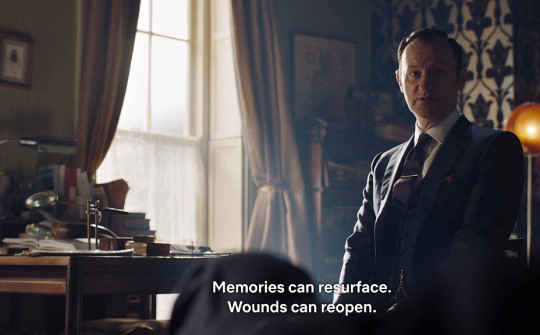
Sherlock really needs to stay alive for John’s sake. But how can you stay alive when Emotions are killing you? Sherlock might think the only solution is to bring them on and face them, try to beat them ‘in a death-defying act’. Which means Sherlock must go deeper still into his own mind, to face his demons.
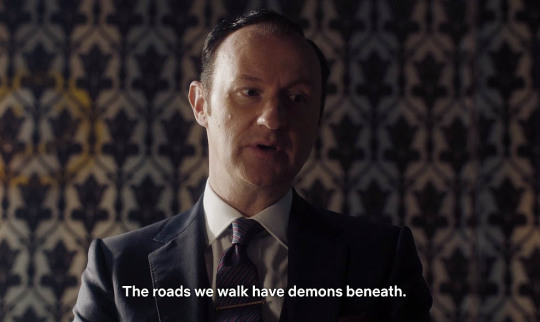
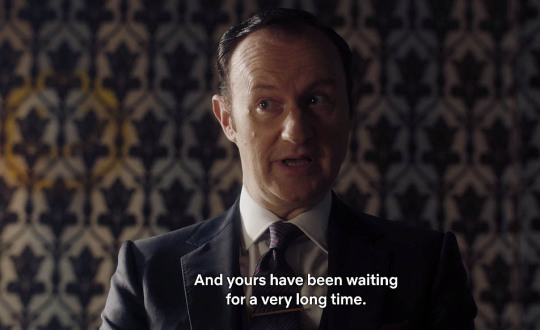
i actually think this is the single bravest thing Sherlock does in the whole show this far. And in order to face his demons and traumatic memories, he needs to perform his Mind Theatre experiments on himself. But who’s the scientist then - who is setting up the experiments? I believe this is done by Sherlock letting someone impersonate a side of himself that he has been hiding and neglecting for a very long time, and who therefore appears to be a cold, calculating psychopath to be feared and avoided: Sister Sentiment.
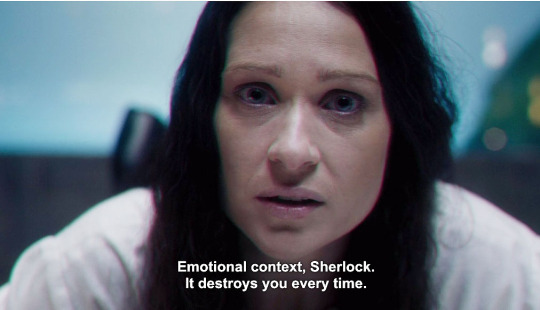
@beingallmysterious said it in their very brilliant meta about Eurus representing Emotion (my bolding, the link also contains the additions):
“The final problem then is reason vs sentiment. How do we live with emotions? Should we lock them up as Mycroft recommends? Sherlock has tried this and it didn’t work. So what’s Sherlock’s solution in the end? He lives with her. He accepts her. He becomes whole again. Reason and sentiment”.
This is, basically, what I think TFP is about. Sherlock might believe he has to defeat and disarm Eurus, but this story tells him (and us) that he rather has to embrace her, accept her as a valid part of himself. So let’s keep on running the scenarios.
TFP, Scenario 1: What happened back then?
Inspiration: It seems like this scenario starts when Mycroft is forced to talk about his and Sherlock’s upbringing and their ‘lost sister’ Eurus. We go back to their childhood and the mansion where the Holmes family used to live. So some of this might be based upon Sherlock’s real memories. But there’s also a resemblance to certain horror movies, which I doubt is a coincidence. I rather believe this is Sherlock’s way of deflecting traumatic memories he’d rather not get into. He uses characters from these movies as ‘actors’, with scary, supernatural powers representing Eurus, such as Orphan:
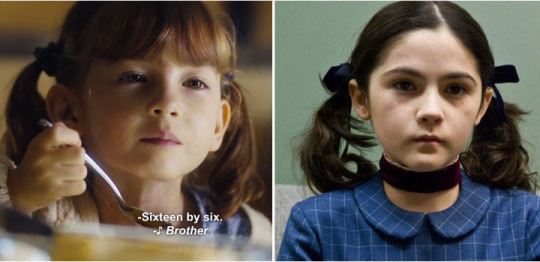
Or The Ring:
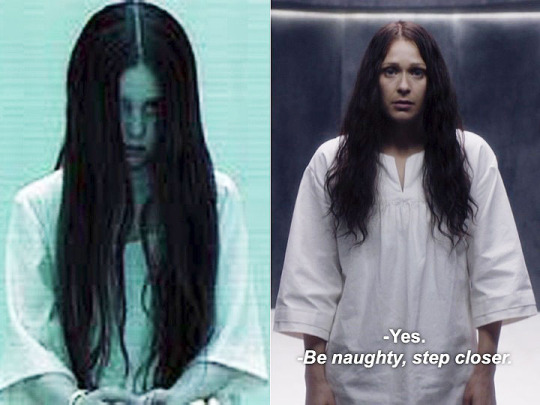
As a bonus, this girl from The Ring (Samara is her name, by the way) also happens to come out of a well (see discussion on the 5th scenario of TFP at the end of this post) and she climbs through the screen of the telly, a bit like Eurus slips through the suddenly non-existent glass wall at Sherrinford.
[Running a scenario where Sherlock and John scare Mycroft into telling the truth about their childhood, when Sherlock used to play pirates with his dog while little Eurus played alone, and they had ‘honey for tea’ at Musgrave Hall. But Eurus seemed to want Sherlock dead and set the mansion on fire, and in present time 221B gets blown up by Eurus’ ‘patience grenade’]
Result: We learn that little Eurus (=Sherlock) set the house on fire and was then ‘taken away’ to some un-named ‘suitable place’, where she started a new fire. And then Uncle Rudy ‘took care of things’; she was declared dead but secretly sent to Sherrinford. In spite of all the absurd creepiness (bizarre clowns, explosions etc), present day Sherlock’s search for his sister leads them to Sherrinford, an isolated prison island way out at sea, where she is (supposedly) locked up. And since John was only sedated at the end of TLD, he’s now with Sherlock again. But well there, the nightmare continues; Sister Sentiment takes over their free will pretty quickly.
Discussion: @sagestreet has made an interesting analysis based on the idea that the memory sticks that keep popping up every now and then in the show represent Sherlock’s “’lost’ memory (about his traumatic past and subsequently repressed gay identity)” @sagestreet theorizes that this ‘lost’ memory might be based on the experience that “Sherlock’s dad was in a gay relationship with his best friend and something went very, very wrong”. And, furthermore, what if this friend was ‘Uncle Rudy’, possibly the brother of Sherlock’s mother?
This idea would be interesting to explore further, and I replied to @sagestreet‘s meta with some more speculation: A triangle drama like this might have had an emotional impact on the kids, perhaps enough to make the older Mycroft ‘abandon’ his own feelings and try to make his little brother do the same. But if little Sherlock (=Eurus) had a too emotional personality to even manage to distinguish one feeling from the other in this mess...
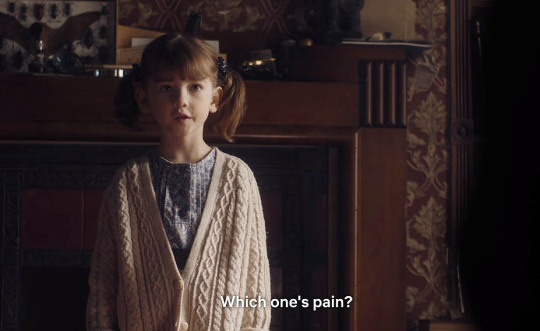
...he might have confused the situation of jealousy, guilt, anger, betrayal etc. in the family with his Dad’s sexual orientation. And it all might have been mixed up into internalized homophobia, where Sherlock would blame himself for having the same kind of feelings as his Dad, which would make him think he risked dragging others into pain and misery.
So what did actually happen? I don’t think we (and Sherlock) really get the answers in TFP, but we do get to feel some of the emotions connected to it, and that’s at least a beginning. Was there a suicide in Sherlock’s family, connected to a possible triangle drama? Or was an impending ‘scandal’ with secret-keeping in a chaotic family situation enough to mess up Sherlock’s emotional life? Was young Sherlock sent to a boarding school? Mental institution? Well, I do hope S5 will offer satisfactory answers to this.
TFP, Scenario 2: Is caring an advantage?
Inspiration: I think this is a key question for Sherlock, something he has been mulling over since he realized that his attitude doesn’t sit well with John, and maybe was the last straw in making John abandon him for someone else. John has been questioning Sherlock’s humanity at least since TGG, and possibly even earlier. If Sherlock did indeed ruin himself on drugs while reading John’s blog after the wedding (as I suggested earlier in this meta series), I think it’s relevant that this is how he came across on the blog after TGG:


So yes - this is one of the main problems that Sherlock needs to investigate in his Mind Theatre to find out what went wrong between him and John.
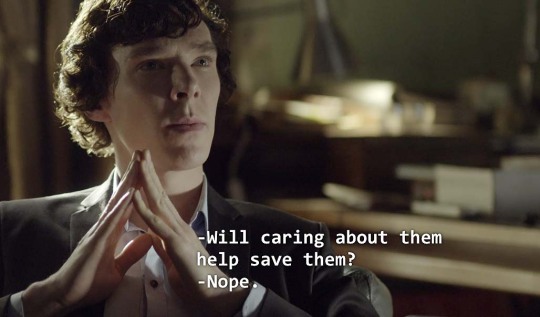
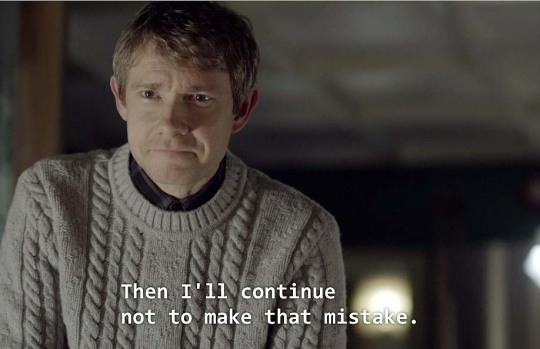
But Sherlock’s statement is contradictory (which I believe John tends to miss, at least consciously). Because trying to save people’s lives already means caring. Sherlock’s actions prove that he already does care about people - why otherwise would he work on crime solving? There are many less humanity-serving ‘games’ he could play and puzzles he could solve to keep himself entertained. So Sherlock definitely does care, but I think his real problem is that he doesn’t permit himself to feel it. Because feeling compassion means exposing himself to other people’s suffering - and his own. Sister Sentiment will make him suffer.
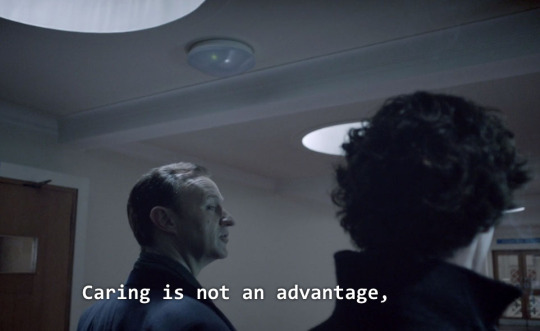
This is what Sherlock has been told, probably by Mycroft, in an attempt to protect his overly emotional little brother from the cruelty of life. The question is, though: Not an advantage for whom? Caring certainly is an advantage for the people you care about. It’s just that it might make you suffer.
[Running the scenario. For the first time in this story Sherlock exposes himself to his own experiments, rather than someone else. These are ethical dilemmas and he finally gets to the point where he’s sincere enough with himself to really face these demons. Because he used to hide from them before, which has deprived him of John. And - as @beingallmysterious said in their meta about Eurus - this is what Sentiment does to you: “Eurus puts Sherlock through torturous mind games. Doesn’t emotion do the exact same thing?” ]
Results and discussion: In Sister Sentiment’s first experiment Sherlock is supposed to make John shoot the Governor of Sherrinford, supposedly to stop Eurus from murdering his wife (which reminds me of a manipulation scheme from the mentalist Derren Brown (X). In his show ‘Push’ Brown tries to manipulate a guy, by group think and submission to authority figures, to ‘commit murder’ and push someone off a building). Sherlock seems very pragmatic about this; we don’t see him hesitate and he’s not even trying to refuse. He keeps playing entirely 'by the rules’:
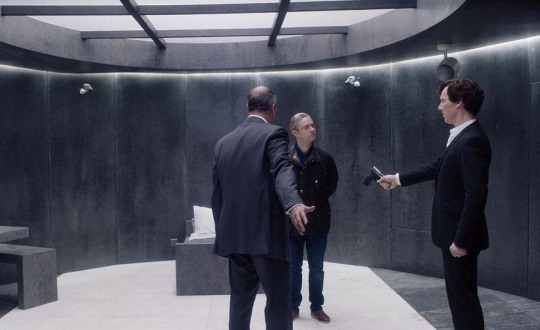
But what if the ‘rules’ are wrong? I think this mirrors how Sherlock, in a way, made John shoot the cabbie through the window in ASiP. If Sherlock had turned in the serial killer to the police instead of joining him to play mind games and prove himself clever, John wouldn’t have had to kill a person, which is a heavy weight to bear. In this scenario it gets clear that John doesn’t want to shoot someone, not even for the ‘greater good’. And in the end the Governor shoots himself to save his wife (who subsequently gets shot anyway). But the link to ASiP is clearly there, in my opinion; why else would they show us this bullet hole, which very much resembles the one where John shot the cabbie?

The next experiment is the three Garrideb brothers who are kept tied-up and dangling over the abyss. This is (supposedly) about solving a crime puzzle, and Sherlock quickly deduces who of the three brothers had committed the murder. But it doesn’t matter to Euros who the guilty is; she kills all three Garridebs anyway. Which resembles the result when Sherlock in TGG focuses a bit too much on the puzzles, without considering the victims (which enrages John). The blind lady had to spend a long time suffering in complete agony, so maybe she could no longer think clearly and started describing the criminal, who then detonated the bomb. Caring about the victim might have been an advantage for solving the case, and I think the important thing was that Sherlock’s cleverness wasn’t enough; the lady and a whole lot of other innocent people died anyway. But at least his compassion might have lessened the time of suffering for the victim. What would have happened if Sherlock had refused to condemn any of the Garridebs? We don’t know, because he thought he could save two of them by solving the puzzle and condemning the guilty one.
In the end it didn’t matter what Sherlock’s brain told him to do in these ‘experiments’; the victims died anyway. Which means caring about them at least wouldn’t have hurt. But I have a feeling that showing compassion in TGG would have solved much of the communication problems between Sherlock and John. Which I hope Sherlock finally begins to understand after TFP.
TFP, Scenario 3: What will happen if Sherlock confesses his love to John?
inspiration: I think this is one of Sherlock’s hardest tasks, because he has nothing to draw from. I think he knows - subconsciously - from TLD that he can’t bring John to ‘confess’ his feelings for Sherlock, unless Sherlock takes the first step. But having repressed his feelings for so long, this isn’t easy for Sherlock. He needs to learn to say the words, yes, but this isn’t enough; he has to actually mean it. Because if he tries to fool John in any way (like he cowardly did in the underground case in TEH), or slip away from it as in the Tarmac scene in HLV, it’s only going to hurt John further and destroy his trust. So that’s why I think Eurus (=Sherlock) sets up this experiment. He needs Molly as a mirror for John, because he isn’t ready to admit this to John’s face just yet.
[Running the scenario, involving a phone call to Molly with a threat of blowing her up if Sherlock can’t have a confession from her]
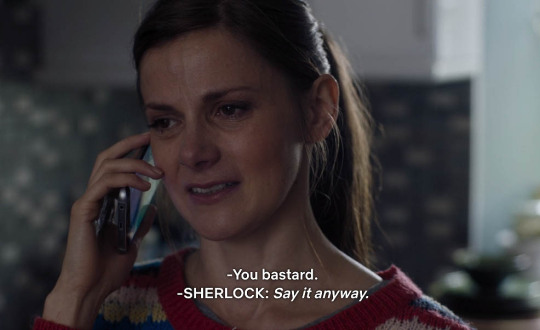
Result: It turns out that Molly (=John) won’t have any of this BS any more; it’s time for Sherlock to come clean.
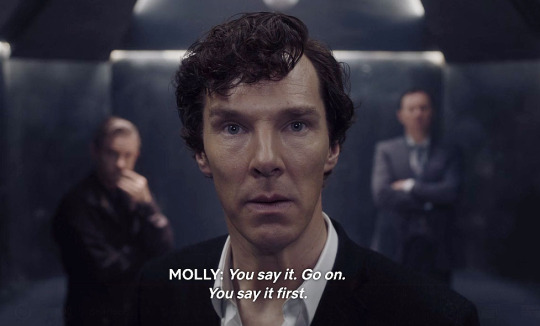
This is not about protecting John, or any other practical or ‘external’ reason for committing to him. It’s the point of no return, the moment of pure and simple honesty. “Tell John the truth” – that’s the mission. And finally, he does.
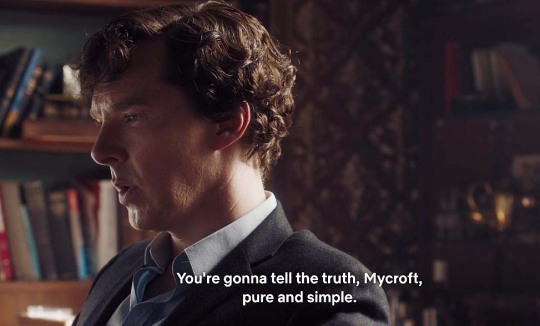
Discussion: This scenario is where I think the quote from Oscar Wilde might come in handy.
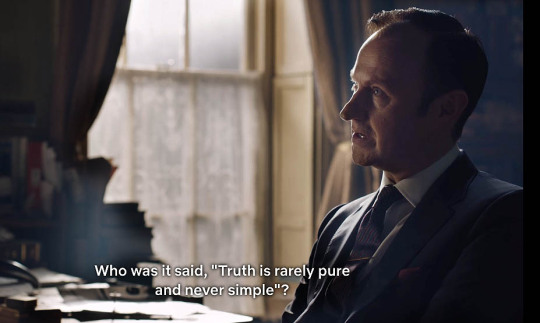
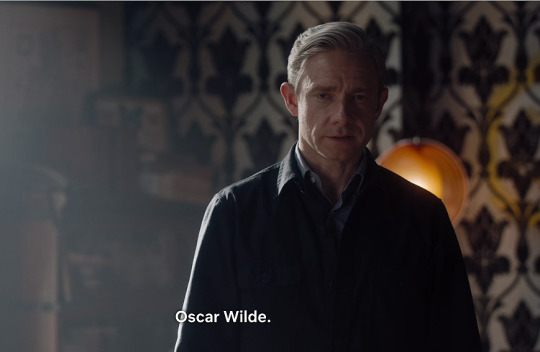
The title of the story that John, Mycroft and Sherlock are talking about is ‘The importance of being Earnest’. I’m not a native English speaker, but the word ‘earnest’ has several meanings, as far as I know. For example serious-minded, solemn, sober. But also heartfelt, sincere and impassioned. And Earnest is also the (false) name of the two protagonists in Wilde’s story, hence the wordplay in the title. In this work, Wilde is depicting two friends that keep lying about who they really are and what’s their real name, in order to escape social obligations. But the subtext is quite loud that this is rather about their relationship than the women they are (supposedly) courting.
The play premiered in London in 1895, the same year as Oscar Wilde was imprisoned and sentenced to two years of hard labour for “gross indecency” (= basically for being gay). And also the same year that has been re-hashed in this show since John’s blog got stuck on 1895 hits in ASiB.
Anyway, this scenario is a key point; it’s where I believe Sherlock finally breaks and starts allowing himself to feel and react emotionally. Sherlock sees 'I love you’ as a defeat and Eurus tells him that he has made more harm than good. But I think he’s on the right track now, because he’s letting himself feel.
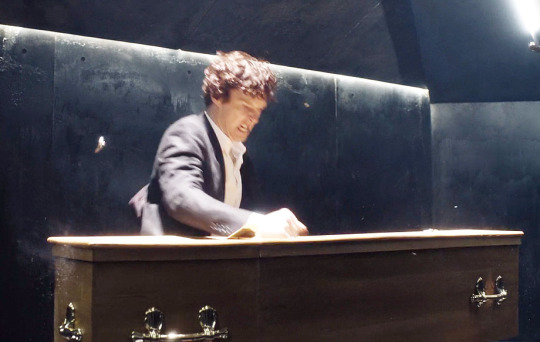
And smashing the coffin might mean that he has actually found the way to save John Watson. Save him from suicide, because that’s what I believe the coffin means, symbolically: the death of John.
TFP, Scenario 4: Heart or brain?
Inspiration: I’m not sure where exactly Sherlock draws from with this one, but this seems to be a nagging question that he has been wrestling with for some time now. In Eurus’ fourth experiment in Sherrinford, Sherlock still keeps playing the game on her terms, by accepting to choose between John and Mycroft; metaphorically heart vs brain. It seems like Sherlock has to either keep his brilliant brain and cut off his heart again, or go by his heart, which will make him lose his head and go insane.
[running the fourth model, involving a gun and a choice]
Result: For a moment, it looks like Sherlock is actually going to choose the heart option and shoot Mycroft, who tries to provoke him to do this. But Sherlock now - for the first time in this story - skips the game and goes for a third option instead: killing himself. Again. Which seems to very much be Moriarty’s (= homophobia’s) goal with this.
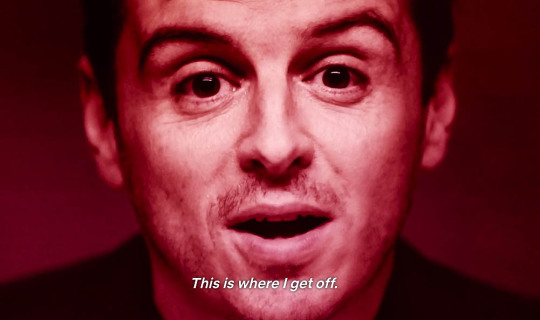
But it doesn’t work, because taking his own life is not the solution Eurus wants, so she doesn’t let him. Sherlock gets sedated, and his choice (to keep both brain and heart) only leads to another prison, where he’s surrounded by old family photos and a dog bowl (=memories). But breaking free from this and solving the Musgrave Ritual is (apparently) the solution.
Discussion: This choice could have been lengthy, but since Eurus (=Sherlock) aborts this scenario rather quickly, let’s just jump to the next one.
Scenario 5: How can Sherlock find the Truth?
The little girl on the plane, whom Sherlock has been trying to communicate with since early on in the episode, is lonely and desperate, and Sherlock is supposed to talk her down, to guide her towards the ground so she can land safely. But we also know that Mycroft (=Sherlock’s brain) was actually planning to let her crash the plane ‘for the greater good’ of other people’s safety.
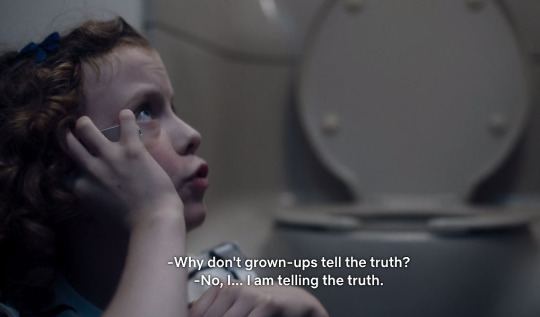
So, are you telling the truth, Sherlock? I’m not so sure about that actually... And did the grown-ups really tell you the truth about certain things when you were a kid? You do seem to doubt it.
Inspiration: Well, once again I suspect that Oscar Wilde might have been an inspiration for this experiment; “Truth is rarely pure and never simple”. But the girl on the plane might also be very much representing how Sherlock is feeling; he might have been withhold truth in his past, so he opted to seek for it himself, always, by using his brain and powers of deduction. But he feels alone and scared, up in his ‘ivory tower’.
[Running a scenario involving a puzzle based on Eurus’ song; is it the solution to this puzzle?]
Result: The little girl is, it turns out, actually Eurus (=Sherlock), who is feeling lost high up in the sky, unable to land with a sleeping driver. Finding Eurus’ “room” by solving the song puzzle means finding the truth. Which means Sherlock can finally save John from the well he’s drowning in.
Discussion: [Ironically enough, in the midst of all this (righteous) rage over the big ‘Purge’ of tumblr, I stumbled over something that I wonder if it’s not a double irony? Or a triple irony?
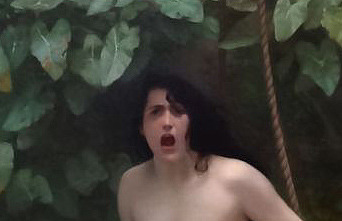
The thing is, that seeing this post about the tumblr censors flagging a 19:th century painting of the “Truth coming out of her well to shame mankind” (X), actually happened to give me something of an epiphany.]
This painting is from 1896 and it’s made by the French artist Jean-Léon Gérôme. You can read more about Gérôme’s work and see this and other of his paintings in this article here. This is the story (my bolding):
“At this time, Gérôme painted a series of works showing the personification of Truth. First, she was shown as a nude at the bottom of a well, either lying on the ground, or standing with a mirror in her hand.”
“Truth Coming out of her Well to Shame Mankind (1896) is based on a quotation from Democritus, “Of a truth we know nothing, for truth is in a well” (or, more literally, ‘in an abyss’), but knowing that reference is of little help in understanding these paintings. Gérôme had given one of the earlier paintings the title of Mendacibus et histrionibus occisa in puteo jacet alma Veritas, which translates as ‘The nurturer Truth lies in a well, having been killed by liars and actors’. In this last version, she has climbed out of the well, and instead of bearing the customary mirror, she brandishes a whip with which to scourge us.”
How many mirrors have we seen in this show by now? I think I lost count already in the unaired Pilot, but I wood guess at least some 50-ish. The point I want to make here, however, is that I believe the Truth Coming Out is central in BBC Sherlock. And in this fifth scenario we have two characters that are trapped in a well, keeping Truth hidden to the world:
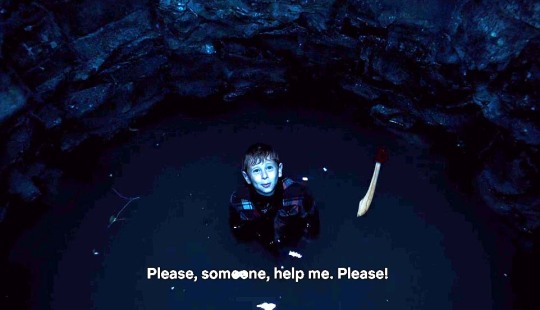
Young Victor Trevor (Sherlock’s mate from college in ACD canon)...
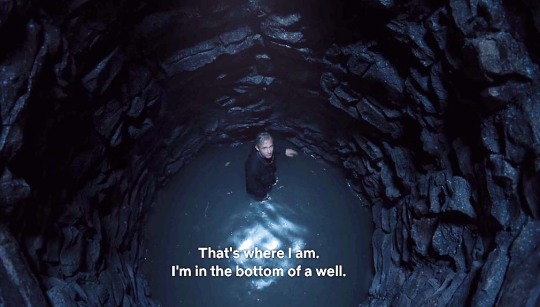
...and adult John Watson.
One of them never came out; he was ‘killed by liars and actors’, people who refused to see the Truth. So something might have happened with Victor, which contributed to Sherlock shutting down his emotions.
But the other one did come out, didn’t he?
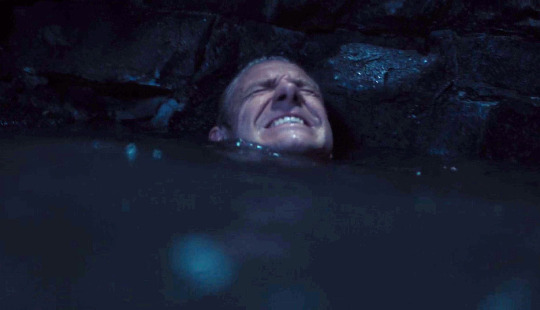
He literally did come out of his well, and he did it with Sherlock’s help. John isn’t exactly naked at the end of TFP, and he isn’t brandishing a whip (that’s Sherlock’s job - right? ;) ), so apparently John isn’t going to shame us. But John is indeed Sherlock’s Truth. If Sherlock is honest with himself, if he’s earnest, i think he must sooner or later admit exactly what John means to him. And John is wearing a blanket, just as Sherlock was after John Saved him in ASiP.
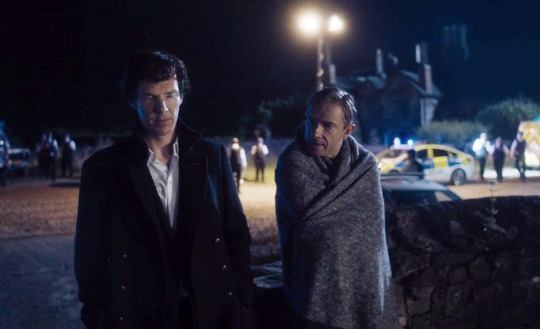
So if John is going to come out in S5, I think it’s perfectly foreshadowed here. And if he does, he’ll bring Truth with him, the true character of their relationship (which is also signaled by the codes of this episode). But it has to be with Sherlock’s help; Sherlock needs to take the first step to help him. This is the first time in S4 that Sherlock actually seems to manage to save John Watson. And he solves the puzzle by realizing that the girl on the plane is Eurus, who desperately needs a hug. Sherlock needs to embrace his own emotions, be OK with them and let them exist at the pair of his rational thinking.
Scenario #6: Does it matter who you really are?
Inspiration: A DVD is in focus here - not a memory stick this time - and it carries a message from ‘Mary’, just like the one at the end of TST, and the ‘unsolved’ (stabbed) case on Sherlock’s mantelpiece in TLD. But should Sherlock actually listen to her?
[The last scenario is a sort of ‘epilogue’ to the events in Sherrinford, where things seem to have ‘straightened up’ again.]
Result: After Musgrave, Eurus is locked up in Sherrinford again; apparently Sherlock still considers his emotional self as being too dangerous to let loose, and now she can’t even speak any more. But we also see Sherlock in a process of healing; he rebuilds 221B with the help of John, and he starts meeting Sister Sentiment regularly, communicating with her directly through the violin. And, as @loveismyrevolution commented here, the beautiful piece they are playing together is called “Who you really are”(X).
“What I try to say is that Sherlock’s emotions are that intense that they must be kept in charge and they are still locked within himself (Sherrinford), but he’s aware of them, is in contact with them, acknowledges them to the outside world and it makes him whole again”.
Discussion: 221B now has a slightly new dressing; some furniture have more rounded edges, and there’s an infant to take care of. Sherlock and John both seems happy with this. Both Greg and Molly pop in, and apparently Sherlock and John are solving crimes together again. But why is Mrs Hudson going around spraying the flat with aerosol?
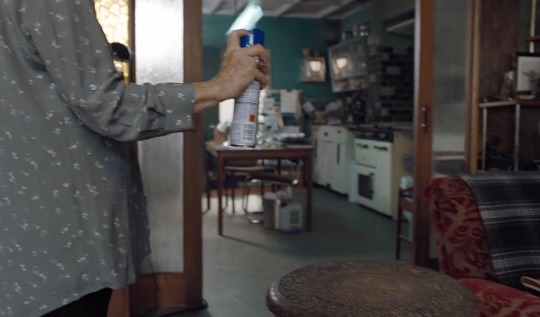
The last (and only) time we saw aerosol in this show was the poisonous, fear-inducing fog at Baskerville and Dewer’s Hollow in THoB. Does this mean that the poisonous homophobia is still around? (I’m going by the metaphors in @sagestreet‘s Follow-the-dog meta here, that the hallucinogenic fog in THoB represents homophobia). Well, to me it definitely seems so, since this important issue still isn’t addressed - far from it, actually. And what about Sherlock facing Death (=Appointment in Samara)? The skull on the wall still seems to be glowing in one of the dull colours it was displaying before 221B got blown up, and John still appears concerned:
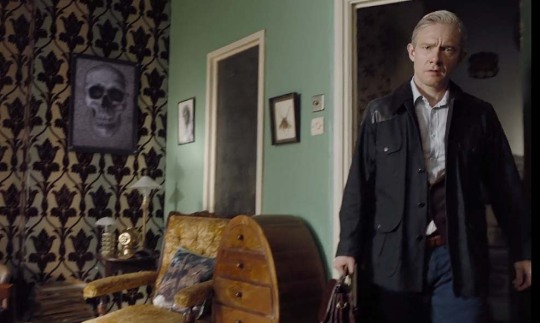
While I still believe, on both the meta level and as in-show ‘reality’, that the Holmes character is dying, at least Sherlock now seems to have faced his demons and thereby got in touch with his own, buried, emotions. But the scenario is very much dominated by ‘Mary’, whose message is two-edged:
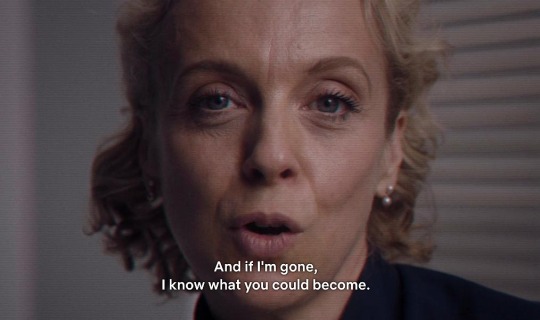
On the one hand she is hinting at what John and Sherlock could become without her. But on the other hand she claims that it doesn’t matter who they really are, and then she calls them “My Baker Street Boys”. Which I take to mean, that we could have our Holmes character two ways: Either we can keep it on a closeted, ‘myths-and-legends’ level as ‘Mary’ says, where Sherlock Holmes is an immortal, indestructible character. But if he can’t die, and he can’t fall in love, neither does he truly appear to be alive, right? The other option is that Sherlock and John need to get rid of her once and for all. Once 'Mary’s messages are no longer dominating, a time may come when Sherlock and John can become something very different from the emotionally repressed characters they remain until the end of this scenario, which has them frozen in time. They might actually come to life far more than in any adaptation this far. There’s a potential there, but also a threat. If it indeed matters ‘who you really are’, I believe this conflict has to be tackled in the next upcoming episodes.
OK, sorry for this meta-marathon, I hop it was at least barely readable. :) In the next installment I’ll analyse ‘Mary’s role more in-depth, trying to test predictions from this hypothesis:
Hypothesis #8. John is not the father of ‘Mary’s baby.
Tagging some people who might be interested: @raggedyblue @ebaeschnbliah @sarahthecoat @gosherlocked @loveismyrevolution @sagestreet @tjlcisthenewsexy @elldotsee @88thparallel @devoursjohnlock @sherlock-overflow-error
22 notes
·
View notes
Text
Tinhatter Shades of Yellow
I posted an excellent article on tinhatting called 50 Shades of Yellow that described behaviors universal to tinhatting and crosses fandoms. I saw some posts today that are great examples of the basic core behaviors. The posts just from today are in bold:
Insisting that couple is closeted against their will. “R/icky M is a formerly closeted man...someone who was closeted for 14 years with a “gf who knew he was gay”.”
Insisting that complex contracts are forcing the celeebirites to keep their Love hidden
PR is the evil villain “...well the new site run by Team Idiotic” “that site is run by his team, so that is how they conduct business. They are awful people”
insisting that the players are communicating with fans through the color of the clothing they wear
fixation on PR. “...another PR nightmare likely.” “....the PR story.’ “Promo will be promo”
Insisting that the motivation behind the evil PR is based on the focus on the money to be made by catering to the interests of the straight female fans: “The only reason a beard is required is because D is in a long-term relationship with a man. If he occasionally dated women, they would use them to promote as it well sell a hell of a lot better than mia/rren as I assume they would have actual chemistry.It is interesting to me that the decisions were immediate. D was sold as straight as soon as we saw Blaine. Immediate. And M had her first, light bearding duty by April, so 6 months after he met C. That was pretty quick action to cover up his actual relationship”. “...it sold straight, “
There is a small group of people doing most of the posting aka “obsessive ringleaders” I pulled all of these off of one blog
“Cult-like allegiance to the narrative” “....CC does not need time to regroup! They have truth on their side”
Insisting that the celebrities are reading their blogs or in other ways interacting secretly with their fandom. “How much fight have we seen in the past week? A LOT. Blinds, Shangela, IG Likes, TSG Preview I believe this is one more hint”. “the misspelling in the first name is also intentional....It could be implying that D currently is outside,as in he is bearded, but he is close to crossing over.”
The piece describes the old tinhatters as being motivated by being in on the secret but that morphed with social media to being the first to know the gossip. Our CCers are still motivated by the secrets. They have a secret blog, they often talk about things they know but won’t share publicly or end with comments like “You don’t know all that I know”. They also have one particular member whose entire blog is innuendo and thickly-veiled very vague maybe stories about her life in Hollywood including her frequent run ins Darren ad Mia at events.. Her posts always read like a “blind post”.
That they “see” clues that only special people can see “I believe this is one more hint.” “Don’t judge people for their beliefs. We all see things the way we do because of experience in life - and some of us have a lot of that, either through age or through a lot of crap that has happened to us.” “I would say taken in conjunction with everything that has happened in a one week period, you should be paying attention.” “ I have MANY facts, “ “Please stop selling the GA a bill of goods”
Tinhat theories always revolve around
misogyny “...laziest woman on the planet.” “She has employed incredibly dirty methods to remain in her position.” “he’s sent out with her the situation is incredibly toxic and at a minimum, jeopardizing his mental health” “ I’m sure money and blackmail’
homophobia
bearding “beard”’ I think it is a kind way to say beard”.
speculation of celebrities gay sex life
idea that LGBTQ people have behaviors and visual signs
This quote is accurate:
Tinhats’ solution for reconciling unpalatable information about celebrities’ personal lives seemed to be to deny its existence completely, leading them to position anyone in a celebrity’s life that offers conflicting evidence as a cog in the management machine, a villainous PR shill dedicated to covering up true love for a vague and arbitrarily defined gain.
I also loved this one because it is SOOOOOOO TRUE
“OF COURSE THE FANS SHOULD SEE THIS,” @spn_gossip shouts into the vast expanse of Twitter. “This is PRECISELY what’s meant to happen.” EVERYTHING THAT IS HAPPENING IS INTENTIONAL.
“Why vocalize hate, it is ridiculous. Why bother?” Indeed why vocalize hate:
4 notes
·
View notes
Text
Musings on A Study in Pink (1)
Trigger Warning (General): Mentions and discussion of homophobia and suicide
More specific trigger warnings will precede each part of the meta
Summary: The theme of the show has been clear since day one. Heteronormativity, homophobia, and toxic masculinity will kill John, Sherlock, and Johnlock if the former are not stopped.
This meta is a series with three parts:
Part 1: Shot in the left shoulder – the Cabbie as a John mirror
Part 2: ‘You can’t have serial suicides’ – media, chain suicides, and social problems
Part 3: ‘Who’d be a fan of Sherlock Holmes?’ – The biggest obstacle to Johnlock
All transcripts taken from Ariane Devere Sherlock episode transcripts. Appropriate pages will be linked after each quote.
All S1-S3 screenshots taken from screencapped.net
Part 1: Shot in the left shoulder – the Cabbie as a John mirror
TRIGGER WARNING: Discussions of homophobia and suicide; image of fake but realistic blood
The main flow of the case in ASiP goes like this: the Cabbie is one of those ‘just want the best for his kids’ parents. He is diagnosed with a terminal illness. Motivated and enabled by Moriarty, he goes on a potentially fatal murder spree, leaving four people dead in his wake. Sherlock eventually solves the case, but the Cabbie is ultimately stopped by John.
In short, the main characters at play are: Moriarty, Cabbie, Sherlock, and John. Moriarty and the Cabbie are the main enigmas. What do they represent?
In Part 1 we will focus on the Cabbie and what he might stand for.
The Cabbie: the ‘this is for your own good’ homophobic parent
One important thing to note is that while the deaths appear to be suicides, they technically aren’t – they are murders. The Cabbie forced the victims to take their own lives. So what exactly motivated the Cabbie to go on this killing spree?
SHERLOCK (thoughtfully): No. No, there’s something else. You didn’t just kill four people because you’re bitter. Bitterness is a paralytic. Love is a much more vicious motivator. Somehow this is about your children.
…
JEFF: When I die, they won’t get much, my kids. Not a lot of money in driving cabs.
…
JEFF: For every life I take, money goes to my kids. The more I kill, the better off they’ll be. You see? It’s nicer than you think. [x]
Sherlock correctly points out that the Cabbie is motivated by what the latter believes to be love for his children—a love that manifests in a rather twisted and bloody way, in this case. He believes he has his children’s best interest in his heart, but he leaves behind a bloody trail. Even if his children do end up getting the money, they are bloody money. If the Cabbie takes the wrong pill and dies, there is no promise the money will arrive at the hands of his children. He believes what he is doing is good for the kids, but in the end, the kids very likely will not benefit from it.
Remind you of anything? To me it sounds like the kind of homophobic parents who want their kids to ‘stop being gay’ because they ‘love’ them. ‘I don’t want you to be bullied or hated by the society so stop being gay’ kind of parent.
What the Cabbie does for a living seems to support this reading, too. The Cabbie drives a cab around (duh). But wait—what exactly are the words used to describe him in the show?
The Cabbie, or the London cabs, ‘passes unnoticed wherever they go’, and the Cabbie ‘hunts in the middle of a crowd’ [x]. Or, in the even more poetic words of Pilot!Sherlock, the cabs are cars that ‘pass like ghosts, unseen, unremembered’; we would willingly and perhaps unconsciously trust them: ‘every day we disappear into their cars and let the trap close around us’.
In short, as Pilot!Sherlock says, the London cab, these public cars, is ‘the invisible car’, ‘the perfect murder weapon of the modern age’. [x]
What do cars mean? @the-7-percent-solution explained, in this short meta, that ‘a way of implying male virility in writing is through the use of cars’. In this sense, then, the London cab represents a kind of male virility that can ‘hunt in the middle of a crowd’, implicitly trusted and taken for granted. In the sexual understanding, the type of male virility that could hunt in the crowd without attracting attention would be straight male virility.
In other words, the Cabbie is basically cruisin’ around London with his car of murderous heteronormativity, hunting down closeted people.
ASiP Recap: the Cabbie’s victims as John mirrors
It is established in the fandom that all victims of the Cabbie are John mirrors [x]. Let’s take a quick look again at who exactly are killed by the Cabbie:
A knight of the realm, locked in a loveless marriage while having an affair with a cutie wearing a purple silk shirt
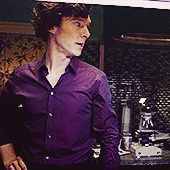
A young man who fears he would look gay if he shares an umbrella with his friend
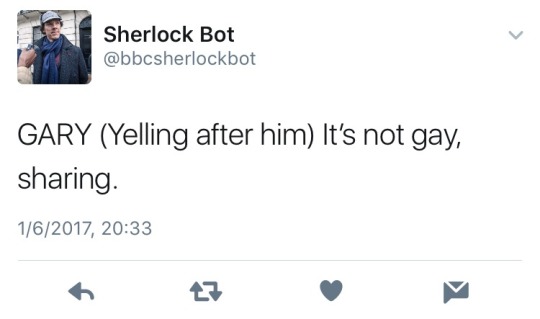
(This is a line deleted from ASiP, in the scene where the young man says he’s running home to grab an umbrella because he does not want to share his friend’s.)
SHERLOCK: Take my hand.
JOHN (grabbing his hand as they race onwards): Now people will definitely talk. [x]
An MP who has a drinking problem and tends to drink-drive unless intervened
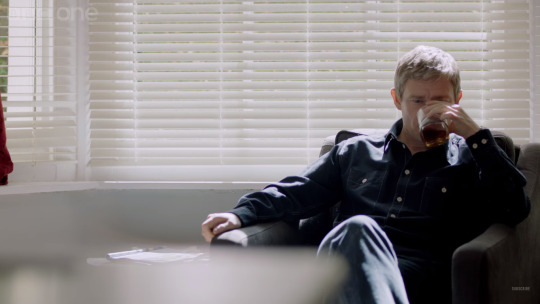
Jennifer Wilson: another who is locked in a loveless marriage, having a string of lovers, and has a stillborn daughter whose initial was RW.
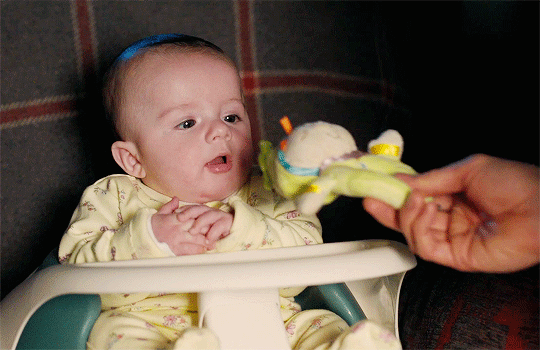
Specifically, all the Cabbie’s victims are mirrors of John after he meets Sherlock. (John might have had a drinking problem before he meets Sherlock, but it seems particularly serious after TRF; there are a lot more references to him drinking.)
As mentioned above, the Cabbie subtextually stands for heteronormativity and homophobia. In other words, John, in all these incarnations, is killed by heteronormativity and homophobia. But wait, there’s more to the Cabbie.
Cabbie as a John mirror
TJLCE lays out the following as signs that a minor character is a mirror [x]:
They look like a main character
They dress like a main character
They have the same name as a main character
They act like/speak like/are in a situation similar to the main character
They hang out in front of mirrors
There are several signs that the Cabbie may be a mirror for John. They both wear knitted jumpers/cardigans. They both have light-coloured hair. John and the Cabbie look just similar enough that one would try to connect the two. Besides, both John and the Cabbie are shot in the left shoulder.
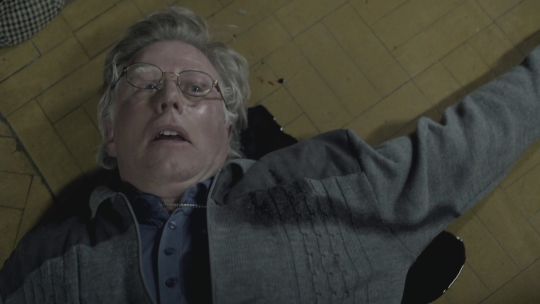
(Some say he is shot in the heart, but it is unclear on screen, and the locations of the shots seem close enough that we can assume they are shot in a similar spot.)
SHERLOCK: In Afghanistan. There was an actual wound.
JOHN: Oh, yeah. Shoulder.
…
SHERLOCK: The left one.
JOHN: Lucky guess. [x]
The Cabbie is also the first person on the show, apart from John, to be shown in possession of a (fake) gun. More importantly, he embodies both life and death like John.
Cabbie: good pill (life), bad pill (death)
John: being a doctor (life), being a soldier (death)
These are all clues that the Cabbie is some kind of John mirror; specifically, the Cabbie is a mirror of John in the army: John is an army doctor and is shot in the left shoulder during his time in the military, and owns a gun because of his military background.
In short, the Cabbie is an army!John mirror.
But there’s more.
Cabbie as a mirror of John’s dad
While writing on the Cabbie as a John mirror, I could not seem to get very far with that analysis. That is when I started noticing details that seem to suggest the Cabbie can be read as an image of John’s dad.
I mentioned above that the Cabbie looks similar enough to John that we can make the connection. While similar, he looks quite a lot older than John’s age, which is early to mid-thirties. In fact, he looks like he could be John’s dad.
John’s dad would have had two kids, a son and a daughter—John and Harry. Likewise, the Cabbie has a son and a daughter.
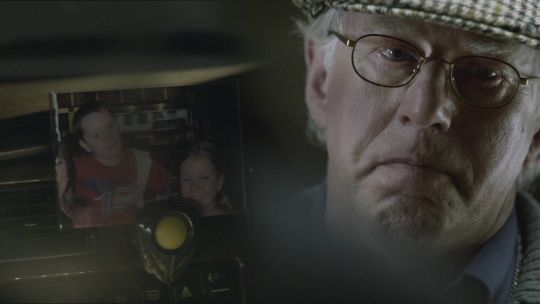
Does army!John plus a son and a daughter immediately make a character a mirror for John’s father? Well, John is likely not the only military man in his family. There are theories that John’s father could also have been in the military. As @shinka lays out here, for instance, Major Barrymore in THoB shines light on the relationship John might have had with his father. John’s father, like Major Barrymore, could have been an ‘old-fashioned, traditionalist’, Thatcher-worshipping man, most likely hyper-masculine and homophobic. Incidentally, that is what the Cabbie supposedly represents.
In short, the Cabbie is also a mirror for John’s dad. Since the ‘military’ aspect of the Cabbie applies to both John and John’s father, it says a lot about John’s background, and the impact his father has on his life…
John’s childhood and military life—was John truly happy in the army?
So far in the show, we know very little about John’s past, and I doubt if it will ever become a major plot point. However, we are able to speculate based on what the Cabbie stands for, and whatever we have already seen in the show.
John’s father—like Major Barrymore, like what the Cabbie represents—is likely an old-fashioned, traditionalist, Thatcher-loving man, possibly also rather homophobic.
The Cabbie has a photo of his children as, well, children, but he seems too old to have children who are that young. He either hasn’t seen them since that age, or, on a more symbolic level, insists on only ever thinking of them as their younger selves.
John and Harry at that age would have been when they either have not realised their sexualities, or have not come out yet. John’s father would have refused to acknowledge the gender and sexualities that his kids come to identify with as they grow up.
The Cabbie (heteronormativity/homophobia) hunts and kills John mirrors, in the belief that what he is doing is good for his kids. We can imagine John’s father claiming the same thing—fiercely or even violently homophobic, John’s father could have, at one point, claimed that he needs to stop his children from being lesbian/bi for their own good. In doing so, he, like many homophobic parents, is driving John to the point of potential suicide.
The fandom has many theories on why John joined the army. Some popular theories include: Medical Corps cadetship covers tuition for a desperate closeted bi teen boy who has moved out of home, or wanting to feel useful while fulfilling his thirst for danger, etc. These are all possible reasons, but if John’s father was indeed in the army, then there may be one more: John may have joined the army to prove himself to his father.
As explained above, John’s father was probably in the military himself. He could even have been a Major, as @kinklock theorises here. We see that in the way John becomes more insecure in front of Major Reed in TSoT. He becomes ‘almost submissive, and seems to be trying to avoid eye contact’, hasty to reassert his title and achievements, and appears shot down when Reed dismisses him:
JOHN (pointing at his ID card): No, sir, I’m Captain John Watson, Fifth Northumberland Fusiliers-
REED: Retired. You could be a used car salesman now, for all I know. [x]
Wellingtongoose reckons, in their meta on John’s career, that John is originally in the Medical Corps, reached the non-combatant, purely administrative rank of Major, but then later switched to be trained as a combatant for whatever reason, which is how he can be both a doctor AND a soldier, and only a Captain at around age 35. His administrative rank as a Major would hold no power in the ‘gritty manly world’ of the Army, which adds a whole other layer to John’s self-esteem issue in relation to his father.
That is not to say, though, that John was unhappy in the army. He clearly takes great pride in his work and achievements. The army is also where John gets to embrace his sexuality to a fuller extent, and address his attraction to men.
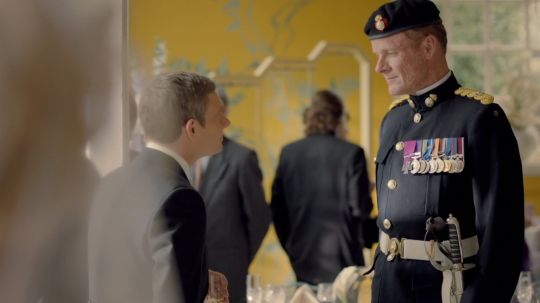
For once, he has a pleasant relationship with a Major. Remember, however, his issues from his childhood remain unaddressed and unresolved. While he may have enjoyed his time in the army, he is still, consciously or not, living in the shadow of his father.
So John shoots the Cabbie…
When John is shot in Afghanistan, he is ripped from the work that he likes, the place that respects him, and the person that lets him be himself (to an extent at least). He is left financially and mentally struggling in London. At the start of ASiP, we have John, suicidal because he is forcibly removed from the one place where he enjoys himself. He would have felt like he has lost his purpose again, ridden with self-doubt, and feeling like somehow he has failed to prove himself.
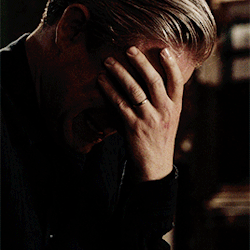
Being invalided out of the army, however, does have one saving grace—one that we have seen time and again in fanfics:
If John has never been shot, he would never have met Sherlock.
Sherlock is key to John’s growth and recovery. He gives John the love and acceptance that has been missing from most of John’s life so far. Sherlock accepts John’s dual occupation (read: his bisexuality) right off the bat without reducing it just one part of it, and provides John with a non-civilian (read: non-heteronormative) lifestyle that John craves:
SHERLOCK: You’re a doctor. In fact you’re an Army doctor.
JOHN: Yes.
(He gets to his feet and turns towards Sherlock as he comes back into the room again.)
SHERLOCK: Any good?
JOHN: Very good.
SHERLOCK: Seen a lot of injuries, then; violent deaths.
JOHN: Mmm, yes.
SHERLOCK: Bit of trouble too, I bet.
JOHN (quietly): Of course, yes. Enough for a lifetime. Far too much.
SHERLOCK: Wanna see some more?
JOHN (fervently): Oh God, yes. [x]
When John shoots the Cabbie—in the same place where John himself is shot, he is symbolically killing the lingering oppression from his father that he has since internalised. Most importantly, John shoots the Cabbie to save Sherlock.

[x]
Sherlock lives means John Watson lives. By shooting the Cabbie—confronting and tackling ‘his doubts and his own crippling self-esteem issues’ [x], John can finally find happiness for himself, with Sherlock (the beginnings of which we have seen in TLD), and resolve his suicide crisis that we have been alerted to at the beginning of the episode.
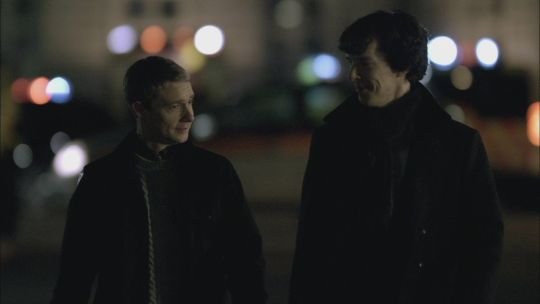
Bonus: Beth Davenport MP and S4 Car Crash Theory
After S4, as a branch of the Mind Bungalow Theory, @toxicsemicolon proposed the Car Crash Theory. You can read about it in detail in the linked meta, but simply put, the Car Crash theory suggests that John is involved in drink-driving accident, and while he is injured, whatever goes on in his head is what we see in The Final Problem.
Do we have another drink-driver on the show? Yes we do, and she is conveniently a John mirror: Beth Davenport MP, aka the Cabbie’s third victim, and ironically enough, the Junior Minister for Transport.
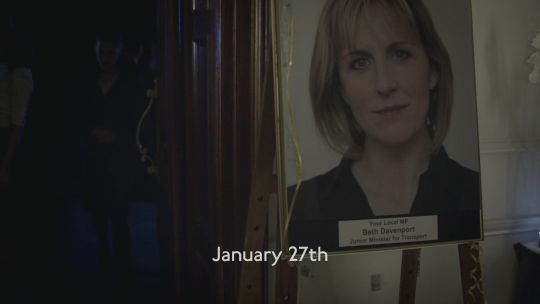
This MP has a drinking problem, and, from a conversation between her two aides, seems to have a tendency to drink-drive unless intervened:
JANUARY 27TH. At a public venue, a party is being held. A large poster showing a photograph of the guest of honour is labelled “Your local MP, Beth Davenport, Junior Minister for Transport.” As pounding dance music comes from inside the room, one of Beth’s aides walks out of the room and goes over to her male colleague who is standing at the bar. He looks at her in exasperation.
AIDE 1: Is she still dancing?
AIDE 2: Yeah, if you can call it that.
AIDE 1: Did you get the car keys off her?
AIDE 2 (showing him the keys): Got ’em out of her bag.
(The man smiles in satisfaction, then looks into the dance hall and frowns.)
AIDE 1: Where is she? [x]
Unfortunately, however, even though her aides prevented her from potentially killing herself and others through a drink-driving rampage, she still runs into the Cabbie and is murdered. It is also the report of her death that prompted John to make the blog post about the serial suicides (details in Part 2). If we follow the reading in this part of the meta, unless John’s demons from his childhood are tackled, even if his current problems (e.g. drinking) are resolved, he would still end up in the same dead end, literally.
Side note: if cars represent male virility, and John (and John mirrors) drink-drive…says a lot about John’s sex life, doesn’t it?
Part 2: ‘You can’t have serial suicides’ – media, chain suicides, and social problems
Part 3: ‘Who’d be a fan of Sherlock Holmes?’ – The biggest obstacle to Johnlock
Part 4: ‘I that am lost, oh who will find me?’ – John Watson’s Final Problem
106 notes
·
View notes
Text
We Need To Talk About ‘Top Privilege’
New Post has been published on http://foursprout.com/happiness/we-need-to-talk-about-top-privilege/
We Need To Talk About ‘Top Privilege’
Charlotte Butcher / Unsplash
One of the most valuable insights I learned from studying sociology is that there is a big difference between what people say and what they do. Humans are complex, contradictory creatures whose behaviors evade simple explanations. Yet, more often than not, we opt for the simplicity of common sense ways of thinking because it’s comforting, and the alternative can be mentally exhausting.
Rembrandt Duran’s recent think piece on gay sex, while seemingly progressive at first glance, commits precisely this type of error by treating socially constructed identities as indisputable truths. A self-professed expert on the matter, Duran begins by informing readers that the time has come to talk about “top privilege.” Extending ideas about race made famous by Peggy McIntosh back in 1989—which have recently gained cultural traction with the rise of Black Lives Matter and other social movements—the author wants to make tops (i.e., insertive partners) aware of their social and cultural advantages in comparison with their passive counterparts. But what exactly he wants tops to do with this political consciousness remains unclear.
Beginning with a brief, if limited, overview of gay men’s sex categories, he goes on to explain how tops—who by mainstream logic are masculine and therefore dominant and strong—get the better end of the cultural stick. In this popular narrative, penetrative sex between men is reduced to a mirror of straight sex, a copy of the original. At this point most of the gay readers out there are probably nodding in agreement thinking about all the times we’ve been asked by clueless straight people: “But which one is the girl in your relationship?”
Next, Remy (as he is known by his following of sex-positive Bushwick hipsters) lists all the ways he is different from those non-self-aware dudes out there. As a “woke top” (my term) he gets it. Whether it’s with higher rates of STIs or the double standard of slut-shaming, the bottom struggle is real.
While Duran points, correctly in my view, to the “internalized homophobia and sexist attitudes towards penetration” many gay men, unfortunately, use to understand our experience of sex, he stops short of actually challenging the entrenched forms of heterosexism and misogyny written into our sexual scripts. He seems to understand there is a problem with the equation of top with masculine and bottom with feminine. However, in taking the meaning behind these perceived identities for granted, he is unable to offer a vision of what a more egalitarian form of sexuality may look like.
So let’s revisit Peggy McIntosh’s metaphorical knapsack and take a moment to “unpack” top privilege.
For starters, any discussion of privilege that narrowly focuses on a singular identity is insufficient in that it fails to recognize the multiple interlocking systems of power that structure our lives—a fact black feminists have been reminding us of for decades. We are not just tops and bottoms, a complementary pair of masc and femme in the bedroom; rather, we bring a multitude of classed, raced, and gendered identities from the public world into the intimate space of our private lives.
If Duran were to examine privilege through an intersectional lens, he could see how racially marginalized men may not find the role of the top as empowering as their white counterparts. Take, for example, Jordan Anderson’s recent feature in Teen Vogue in which he discusses what it’s like to use Grindr (the gay dating and hookup app) as a black man while vacationing in Italy. “The European gay community that I encountered was interested in having me help them fulfill the fantasies they’d created based solely on the color of my skin,” he regrettably finds. “But they were completely opposed to the idea of a date or a relationship.” In considering this case, which is borne out by the data on race and online dating, it is incumbent on us to ask: Can someone who is objectified as an exotic Other have top privilege?
Moreover, are self-proclaimed tops privileged in similar ways to other dominant groups? Although I do not dispute Duran’s argument that many gay men talk about tops in ways that place them on a higher rung in the ladder of social hierarchies, I nonetheless hesitate to compare sex positions with other markers of social location such as class, race, and gender. Not only does such a logical leap reify the top/bottom binary (and I remain highly skeptical that any gay man is uniformly one thing across his entire sexual lifespan), but it also renders serious discussions of power and privilege meaningless.
It is more accurate, in my view, to decry masculinity as the privileged culprit in our oppressively gendered sexual relations. Being a top is just one feature within a whole field of heterosexual masculinity that is ripe for deconstruction. The real work ahead for queer revolutionaries rests in troubling the compulsory narrative that claims we must all be either males or females with appropriately corresponding gender presentations who, in turn, naturally desire members of the opposite sex. All of this goes without mentioning practices out there that already challenge compulsory heterosexuality: women into pegging, trans tops, power bottoms (which could be a whole essay unto itself), gay sex which (gasp!) doesn’t involve penetration, and the list goes on.
Queer sex needs to tell a different story, one that doesn’t position receptivity or femininity as necessarily inferior. Duran’s suggestion to end sexual stigma, however, doesn’t rewrite this script. Instead, it proposes a tepid politics of appreciation. “We need to cherish our Bottoms for all they put up with and do for us,” he concludes. “Let’s talk about our Top privilege and try and do better by them.” Going back to the racial genesis of the concept of privilege, it’s hard to see how such a solution holds up. It’s like saying: If only white people cherished minorities more. If only men cherished women. If only the straights cherished the gays.
A more enlightened approach might critically engage with deeper social structures and move beyond a simple analysis of thoughts, feelings, and individual biases. This is how we can challenge heteronormative modes of thinking that automatically assume sex positions are essential aspects of gay identity and that automatically cast bottoms as passive and weak. If “tops” are really interested in democratizing sex, we don’t need them to check their privilege. We need them to recognize their partners’ agency and stop pretending that imaginary identities grant them privilege in the first place.
0 notes
Text
We Need To Talk About ‘Top Privilege’
New Post has been published on http://foursprout.com/happiness/we-need-to-talk-about-top-privilege/
We Need To Talk About ‘Top Privilege’
Charlotte Butcher / Unsplash
One of the most valuable insights I learned from studying sociology is that there is a big difference between what people say and what they do. Humans are complex, contradictory creatures whose behaviors evade simple explanations. Yet, more often than not, we opt for the simplicity of common sense ways of thinking because it’s comforting, and the alternative can be mentally exhausting.
Rembrandt Duran’s recent think piece on gay sex, while seemingly progressive at first glance, commits precisely this type of error by treating socially constructed identities as indisputable truths. A self-professed expert on the matter, Duran begins by informing readers that the time has come to talk about “top privilege.” Extending ideas about race made famous by Peggy McIntosh back in 1989—which have recently gained cultural traction with the rise of Black Lives Matter and other social movements—the author wants to make tops (i.e., insertive partners) aware of their social and cultural advantages in comparison with their passive counterparts. But what exactly he wants tops to do with this political consciousness remains unclear.
Beginning with a brief, if limited, overview of gay men’s sex categories, he goes on to explain how tops—who by mainstream logic are masculine and therefore dominant and strong—get the better end of the cultural stick. In this popular narrative, penetrative sex between men is reduced to a mirror of straight sex, a copy of the original. At this point most of the gay readers out there are probably nodding in agreement thinking about all the times we’ve been asked by clueless straight people: “But which one is the girl in your relationship?”
Next, Remy (as he is known by his following of sex-positive Bushwick hipsters) lists all the ways he is different from those non-self-aware dudes out there. As a “woke top” (my term) he gets it. Whether it’s with higher rates of STIs or the double standard of slut-shaming, the bottom struggle is real.
While Duran points, correctly in my view, to the “internalized homophobia and sexist attitudes towards penetration” many gay men, unfortunately, use to understand our experience of sex, he stops short of actually challenging the entrenched forms of heterosexism and misogyny written into our sexual scripts. He seems to understand there is a problem with the equation of top with masculine and bottom with feminine. However, in taking the meaning behind these perceived identities for granted, he is unable to offer a vision of what a more egalitarian form of sexuality may look like.
So let’s revisit Peggy McIntosh’s metaphorical knapsack and take a moment to “unpack” top privilege.
For starters, any discussion of privilege that narrowly focuses on a singular identity is insufficient in that it fails to recognize the multiple interlocking systems of power that structure our lives—a fact black feminists have been reminding us of for decades. We are not just tops and bottoms, a complementary pair of masc and femme in the bedroom; rather, we bring a multitude of classed, raced, and gendered identities from the public world into the intimate space of our private lives.
If Duran were to examine privilege through an intersectional lens, he could see how racially marginalized men may not find the role of the top as empowering as their white counterparts. Take, for example, Jordan Anderson’s recent feature in Teen Vogue in which he discusses what it’s like to use Grindr (the gay dating and hookup app) as a black man while vacationing in Italy. “The European gay community that I encountered was interested in having me help them fulfill the fantasies they’d created based solely on the color of my skin,” he regrettably finds. “But they were completely opposed to the idea of a date or a relationship.” In considering this case, which is borne out by the data on race and online dating, it is incumbent on us to ask: Can someone who is objectified as an exotic Other have top privilege?
Moreover, are self-proclaimed tops privileged in similar ways to other dominant groups? Although I do not dispute Duran’s argument that many gay men talk about tops in ways that place them on a higher rung in the ladder of social hierarchies, I nonetheless hesitate to compare sex positions with other markers of social location such as class, race, and gender. Not only does such a logical leap reify the top/bottom binary (and I remain highly skeptical that any gay man is uniformly one thing across his entire sexual lifespan), but it also renders serious discussions of power and privilege meaningless.
It is more accurate, in my view, to decry masculinity as the privileged culprit in our oppressively gendered sexual relations. Being a top is just one feature within a whole field of heterosexual masculinity that is ripe for deconstruction. The real work ahead for queer revolutionaries rests in troubling the compulsory narrative that claims we must all be either males or females with appropriately corresponding gender presentations who, in turn, naturally desire members of the opposite sex. All of this goes without mentioning practices out there that already challenge compulsory heterosexuality: women into pegging, trans tops, power bottoms (which could be a whole essay unto itself), gay sex which (gasp!) doesn’t involve penetration, and the list goes on.
Queer sex needs to tell a different story, one that doesn’t position receptivity or femininity as necessarily inferior. Duran’s suggestion to end sexual stigma, however, doesn’t rewrite this script. Instead, it proposes a tepid politics of appreciation. “We need to cherish our Bottoms for all they put up with and do for us,” he concludes. “Let’s talk about our Top privilege and try and do better by them.” Going back to the racial genesis of the concept of privilege, it’s hard to see how such a solution holds up. It’s like saying: If only white people cherished minorities more. If only men cherished women. If only the straights cherished the gays.
A more enlightened approach might critically engage with deeper social structures and move beyond a simple analysis of thoughts, feelings, and individual biases. This is how we can challenge heteronormative modes of thinking that automatically assume sex positions are essential aspects of gay identity and that automatically cast bottoms as passive and weak. If “tops” are really interested in democratizing sex, we don’t need them to check their privilege. We need them to recognize their partners’ agency and stop pretending that imaginary identities grant them privilege in the first place.
0 notes